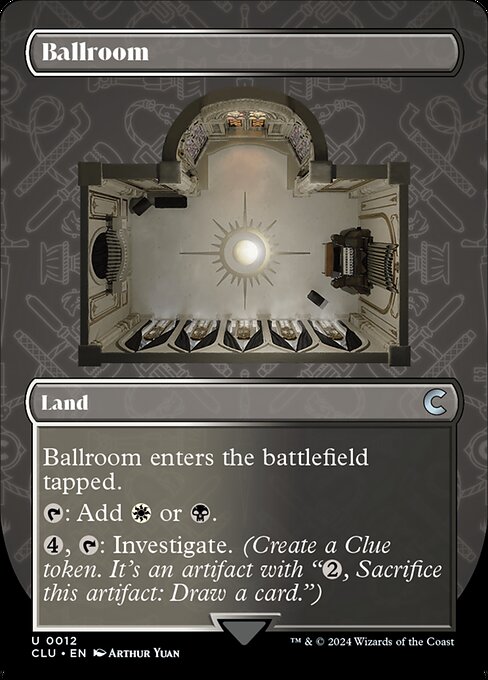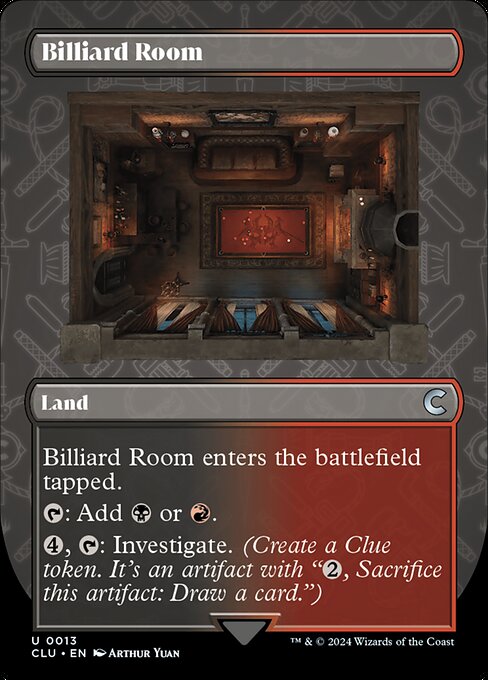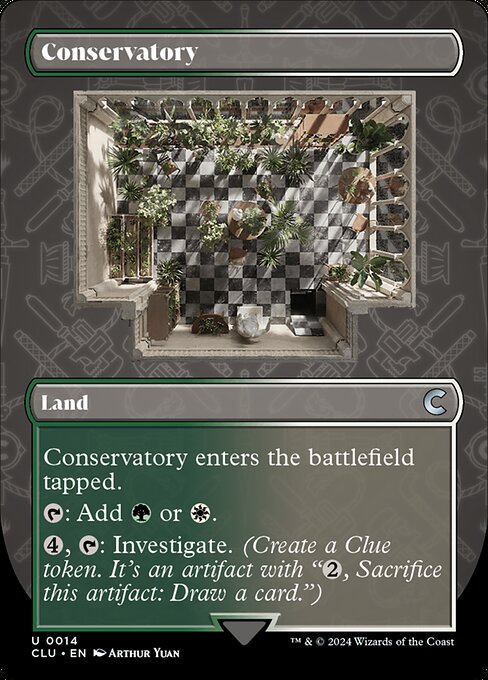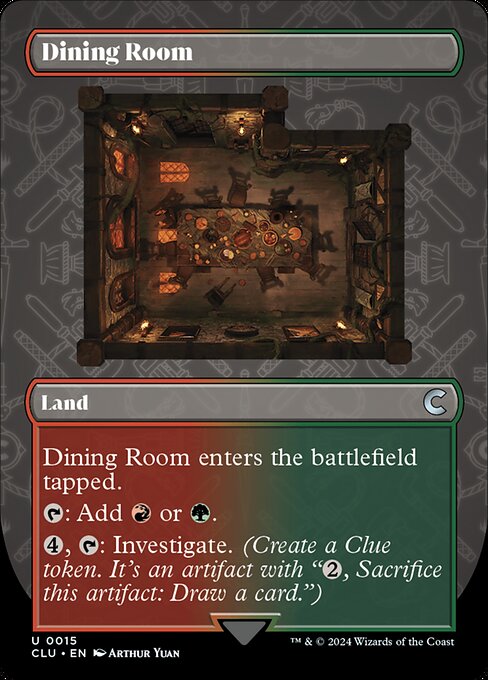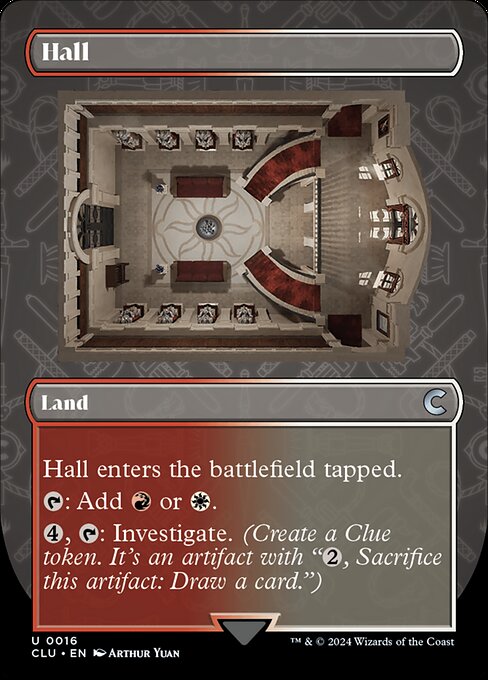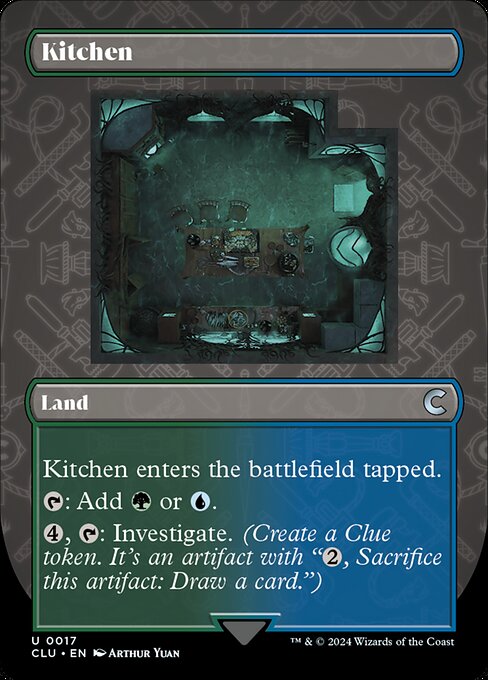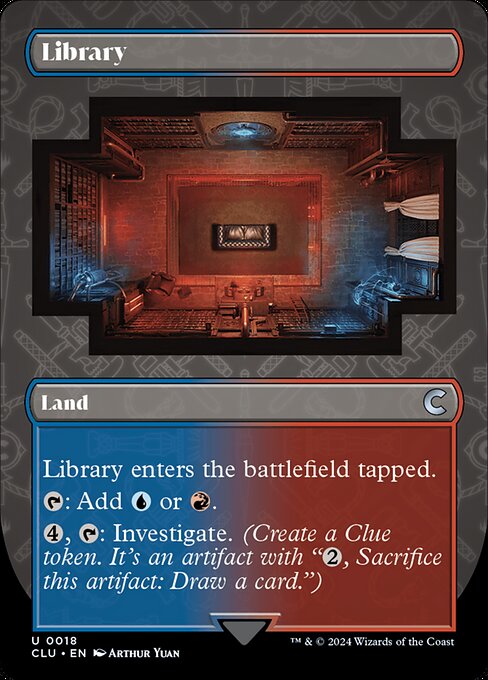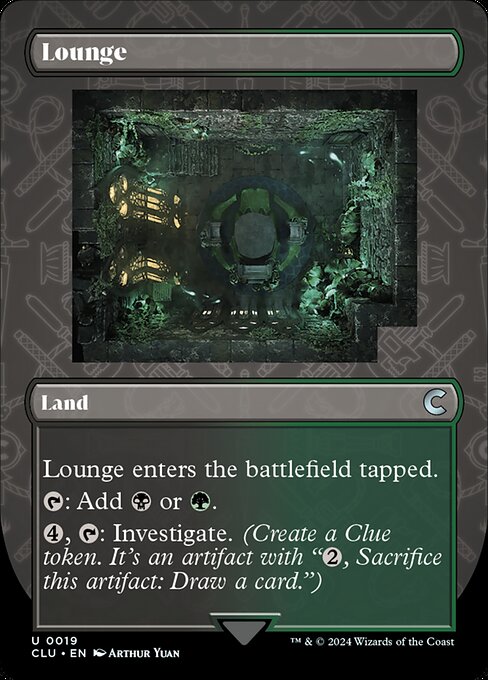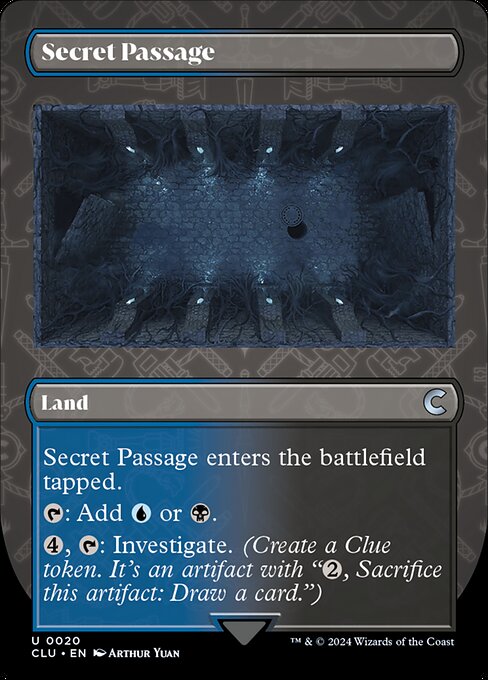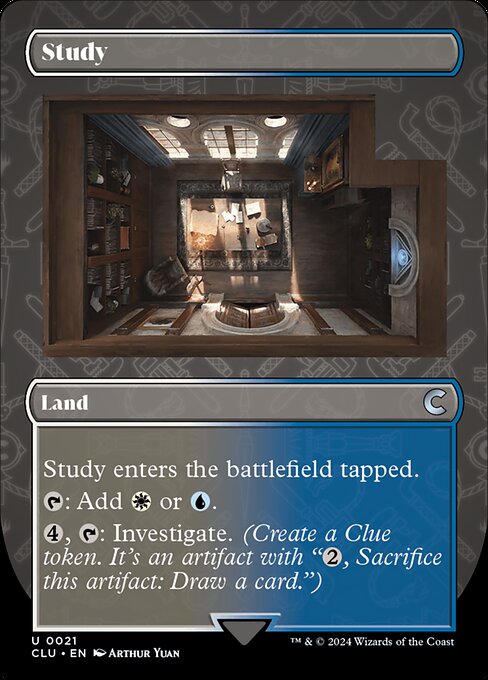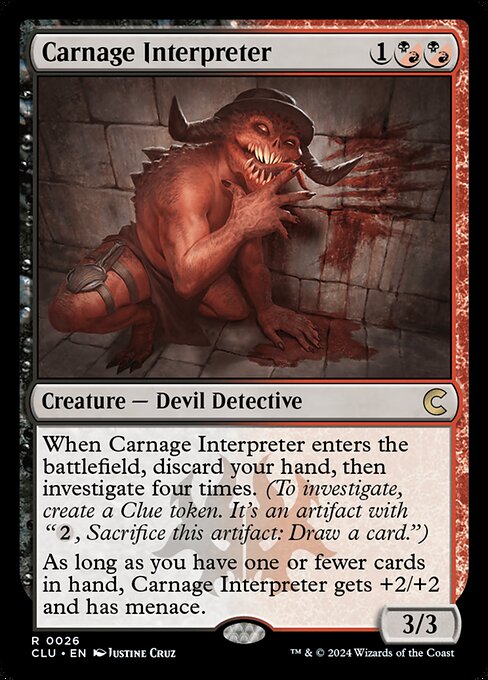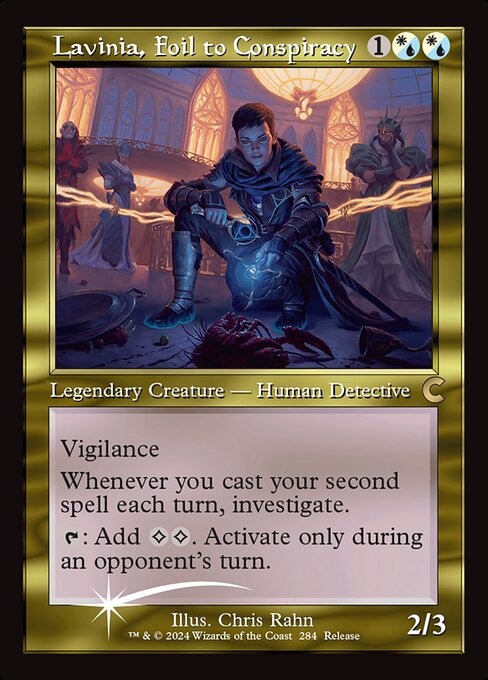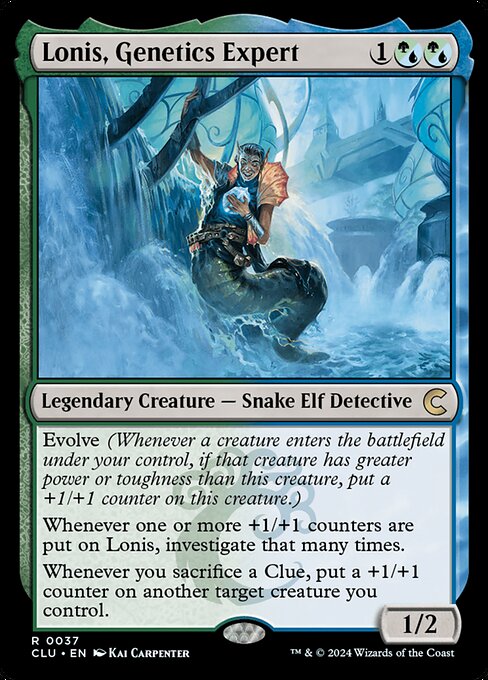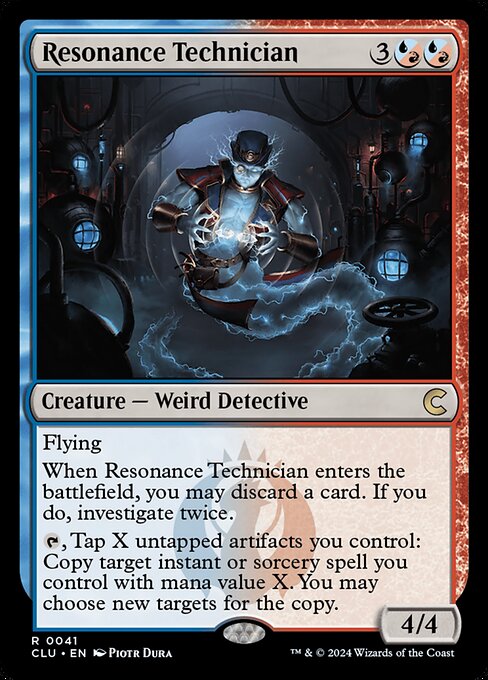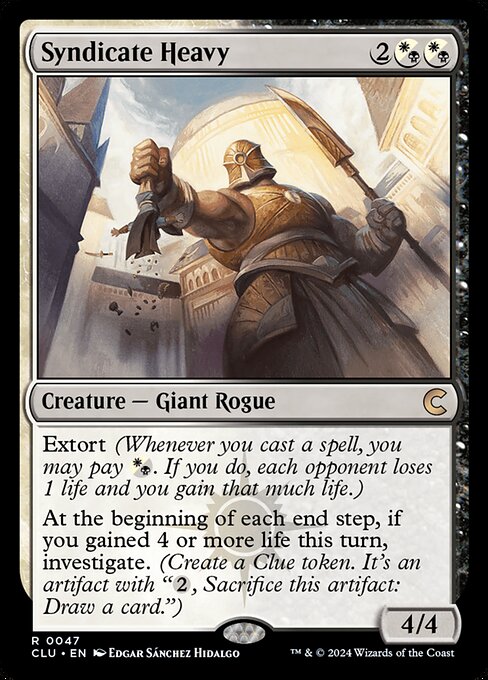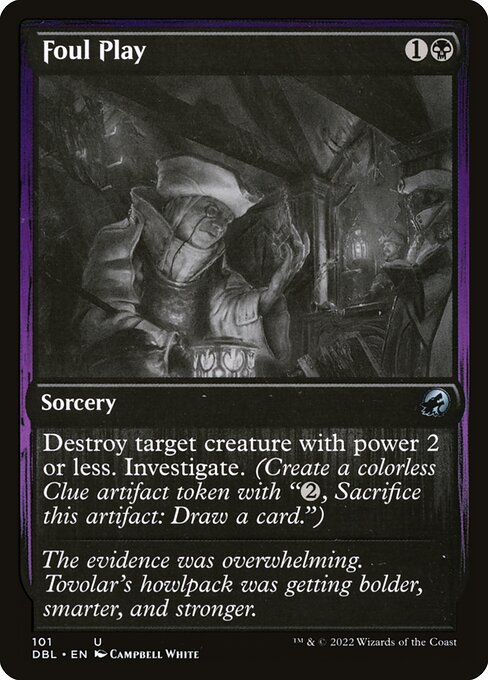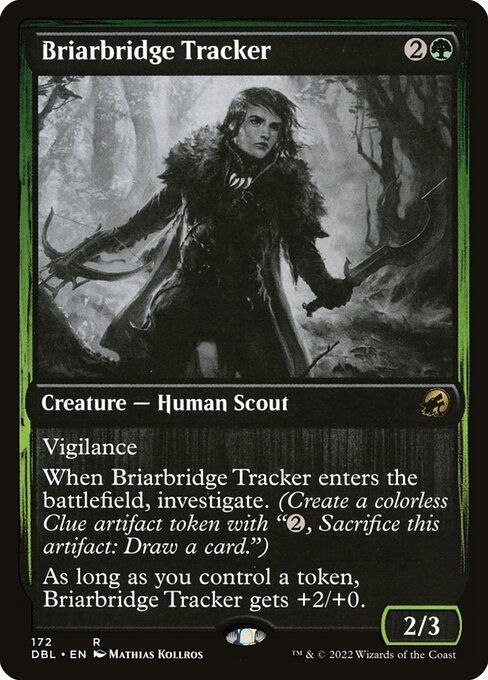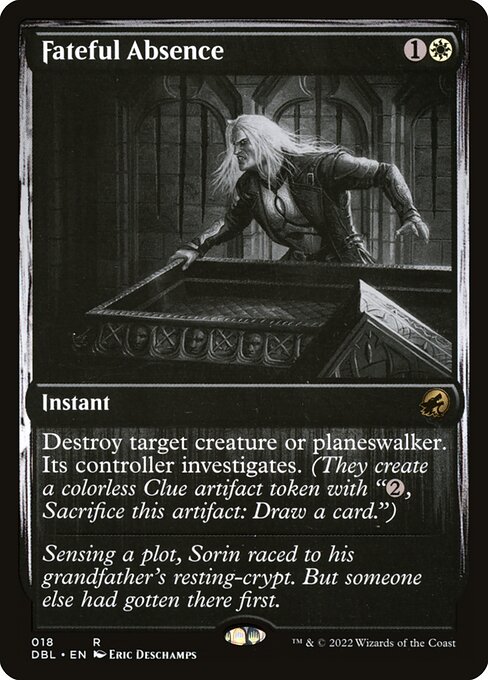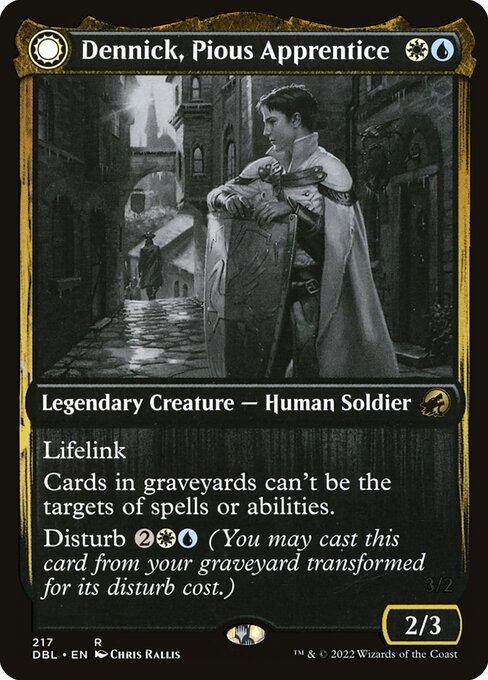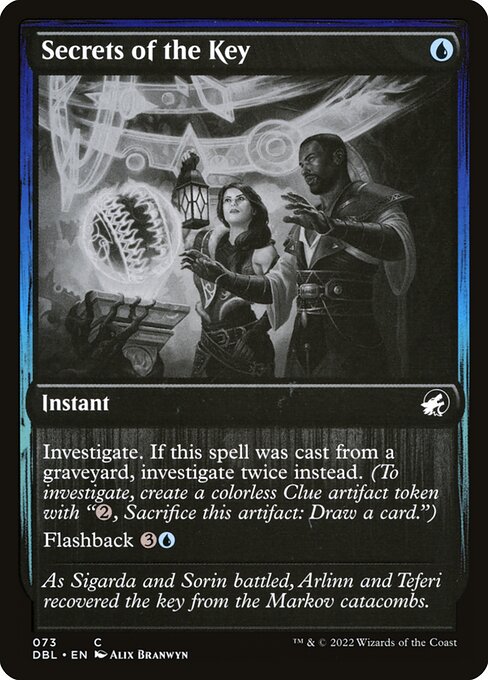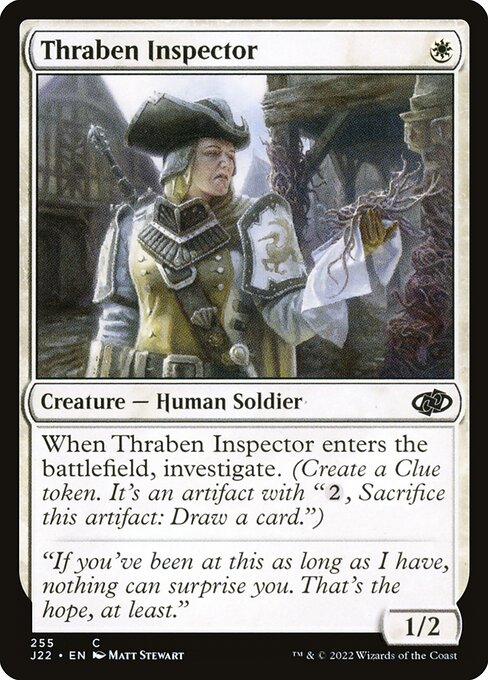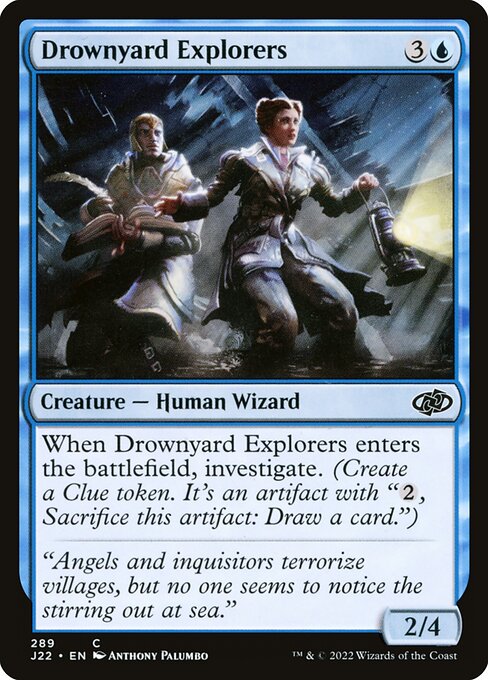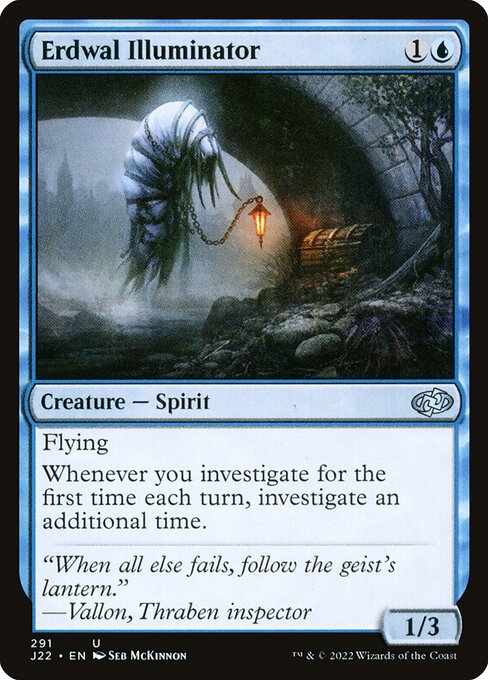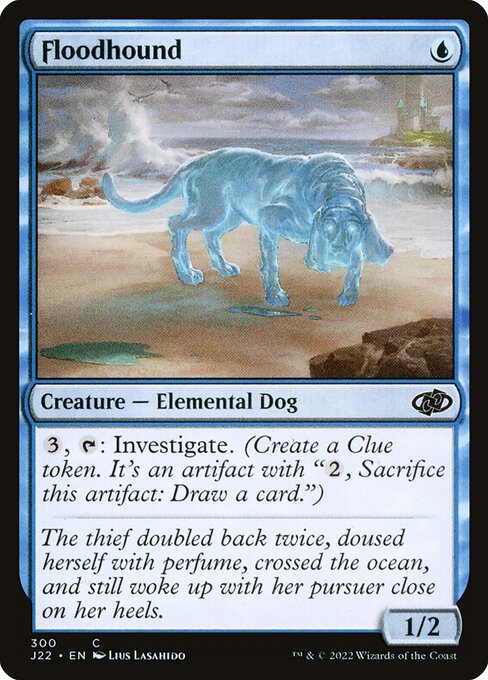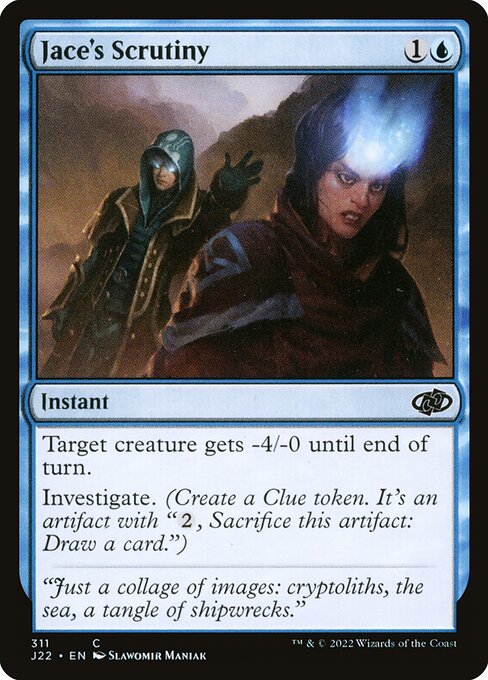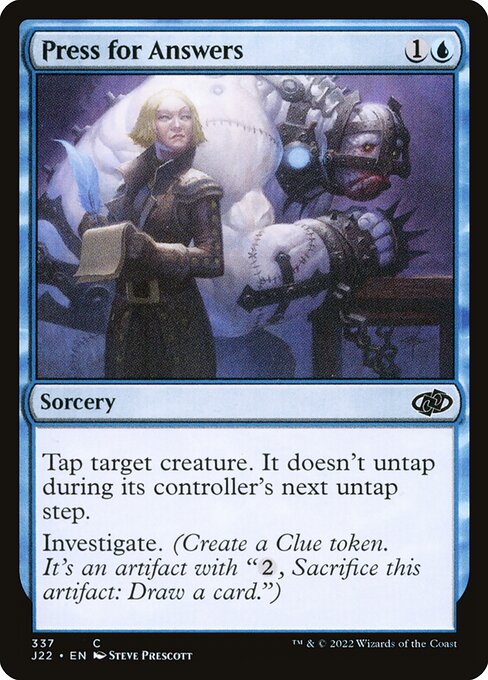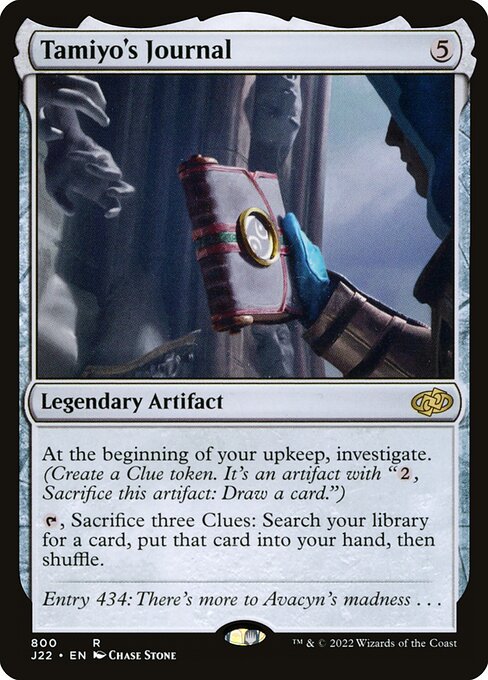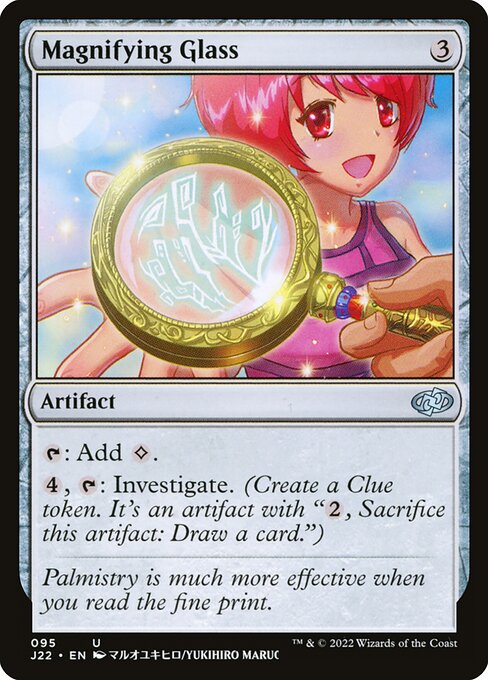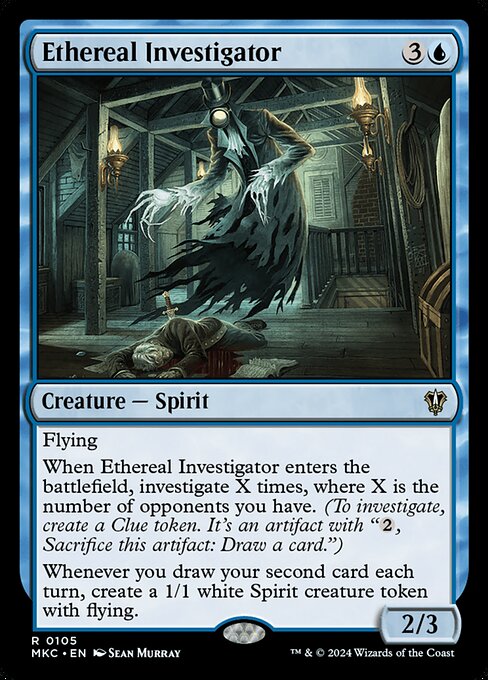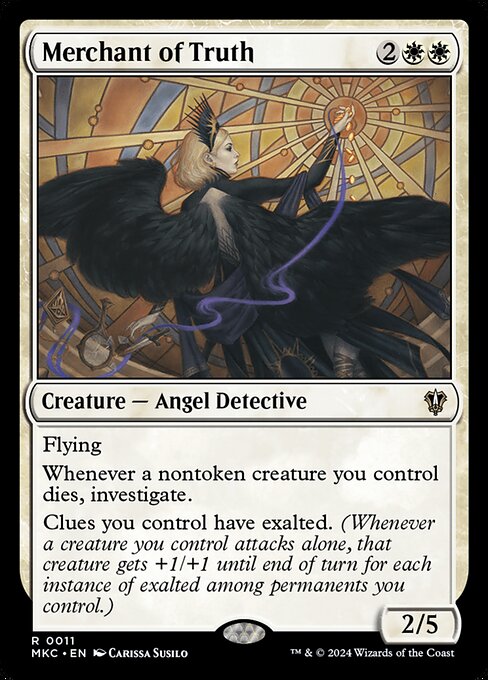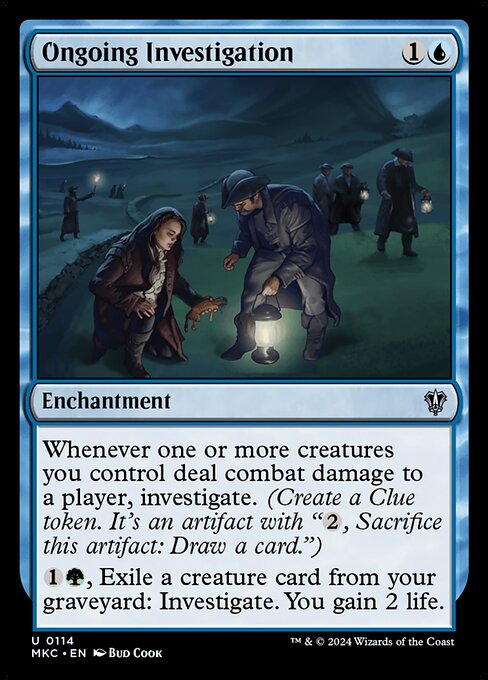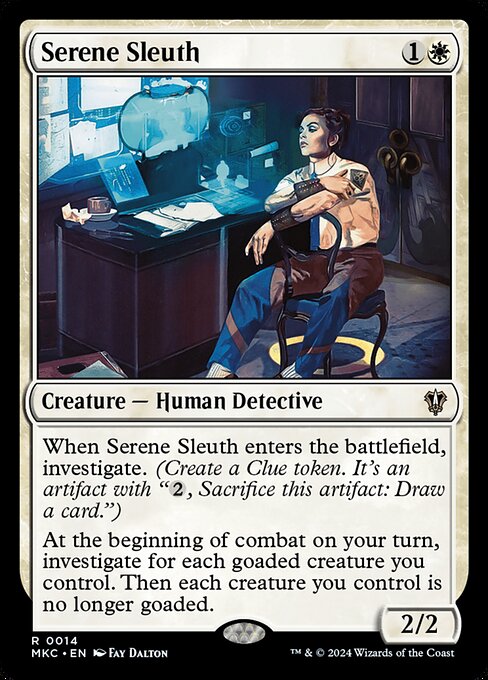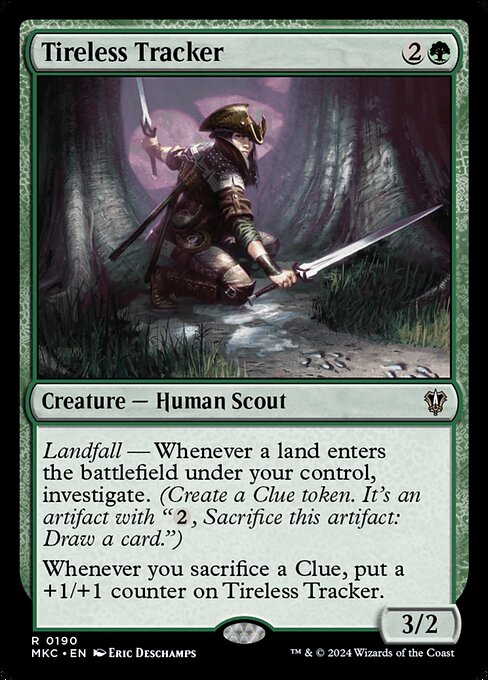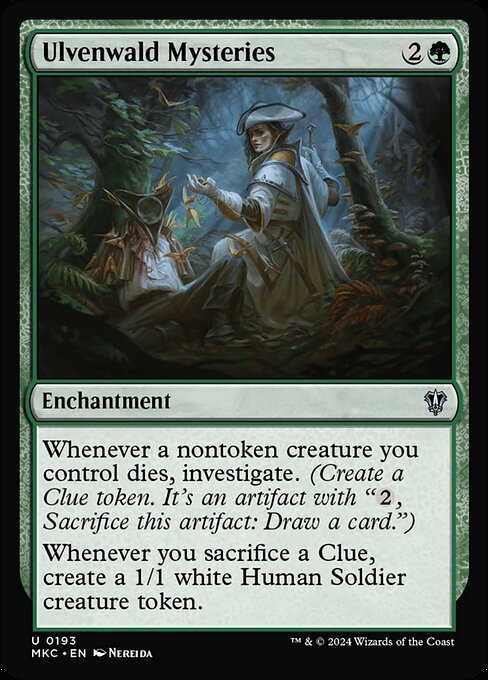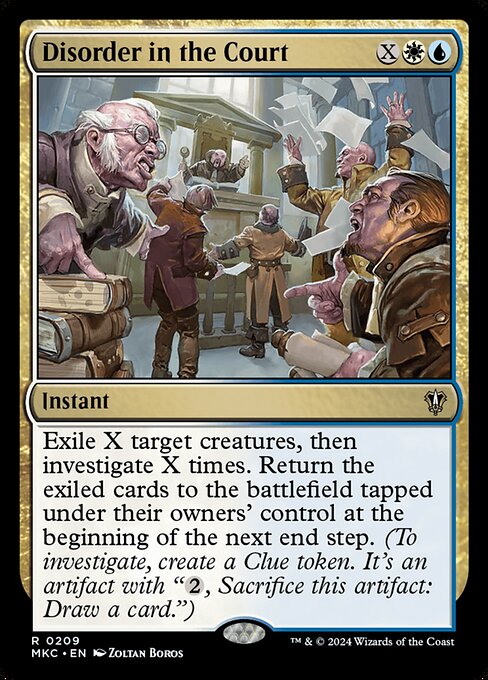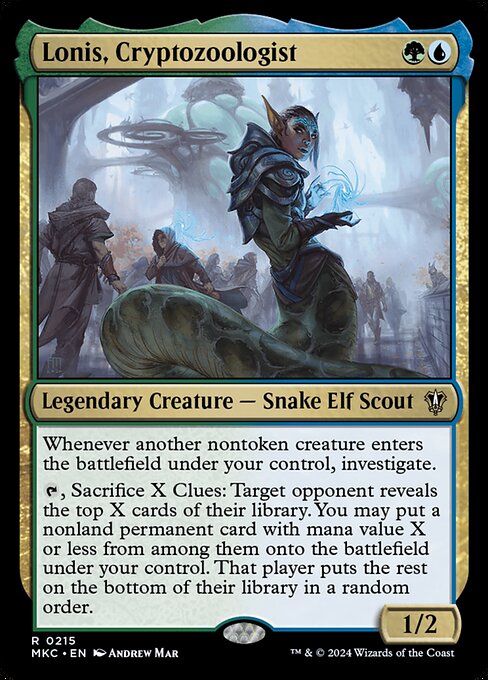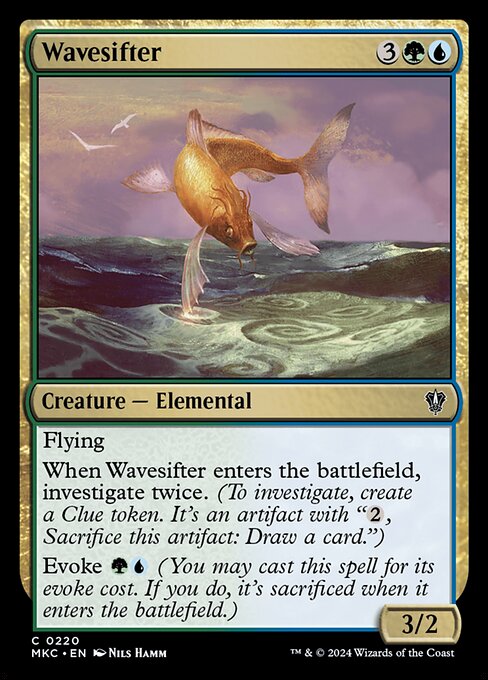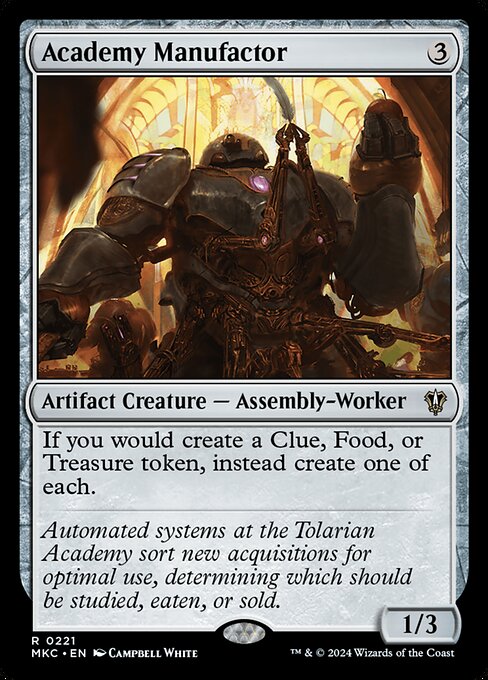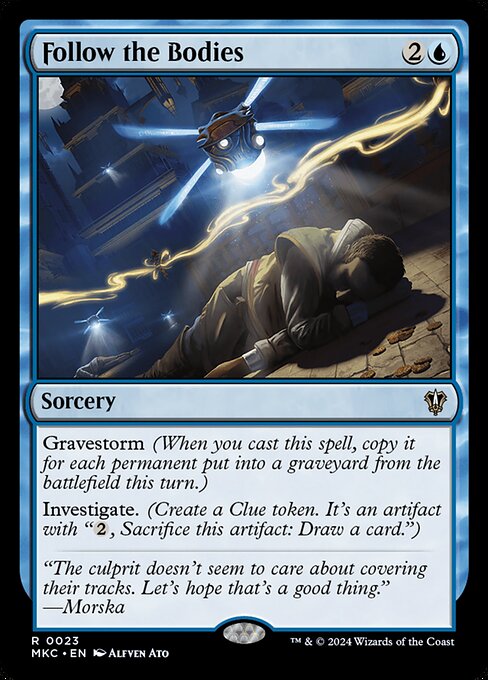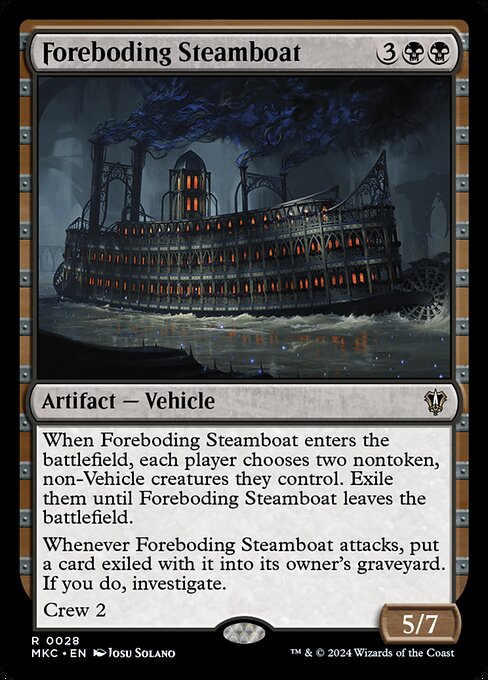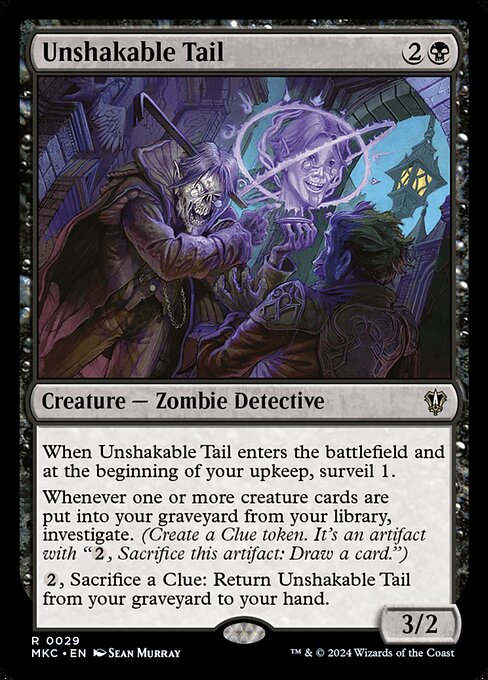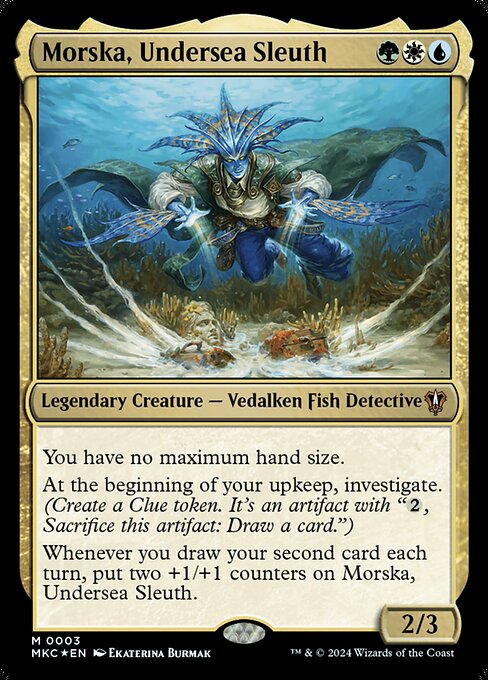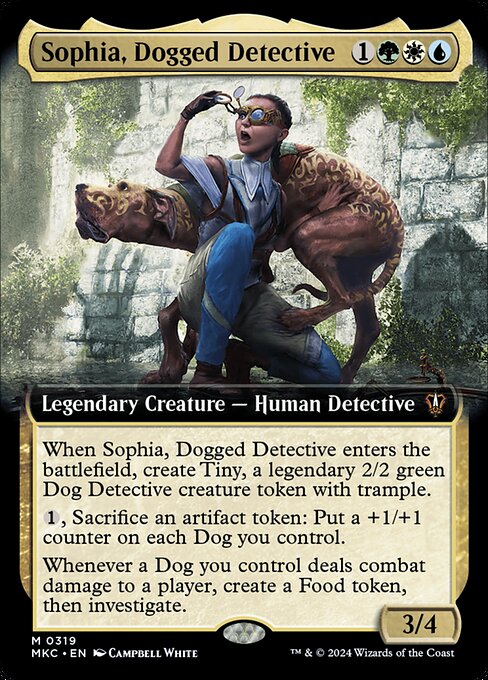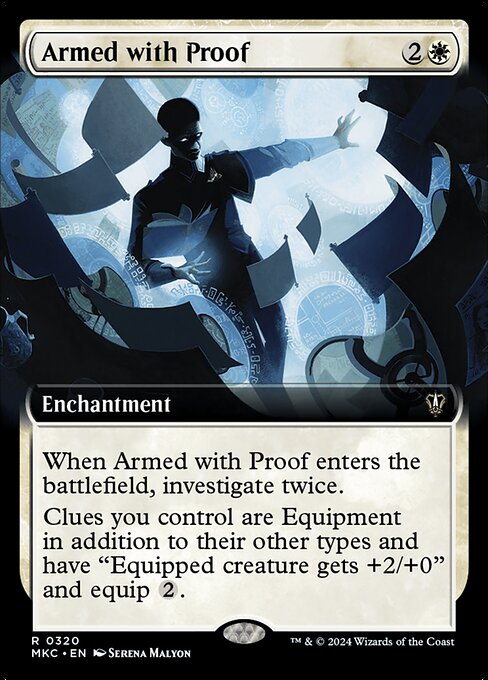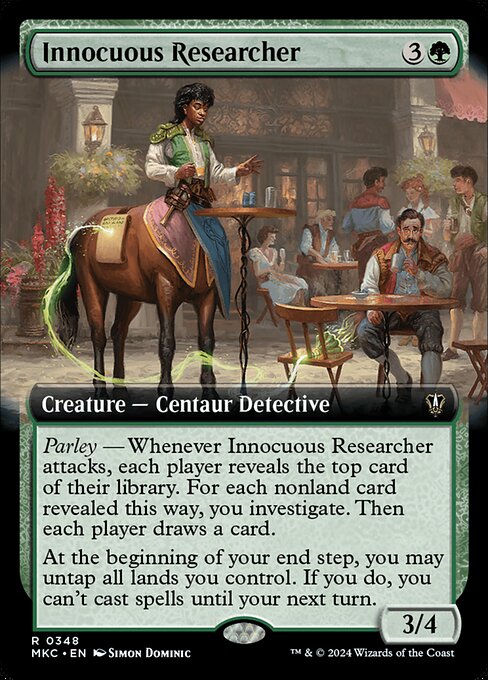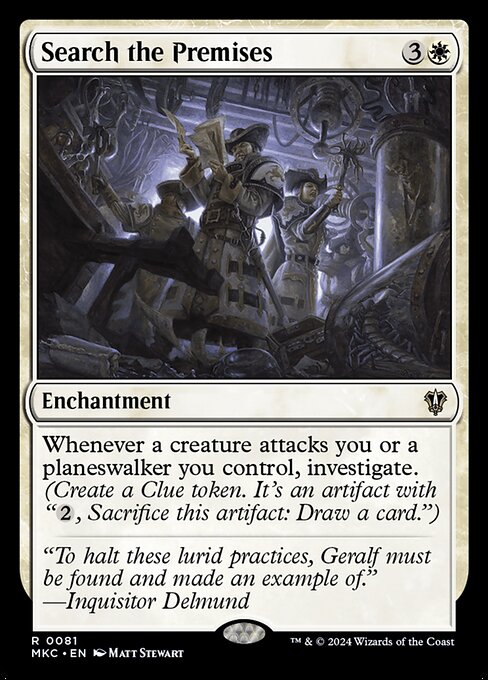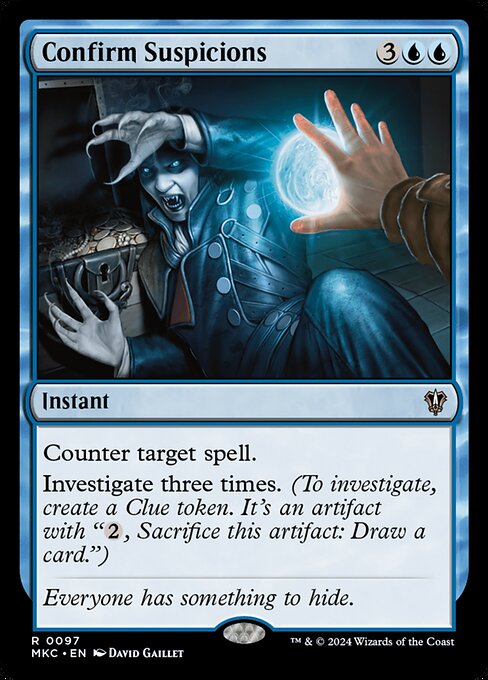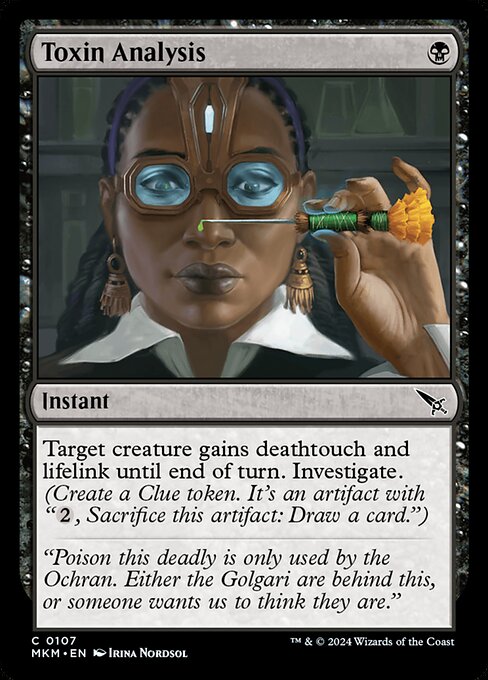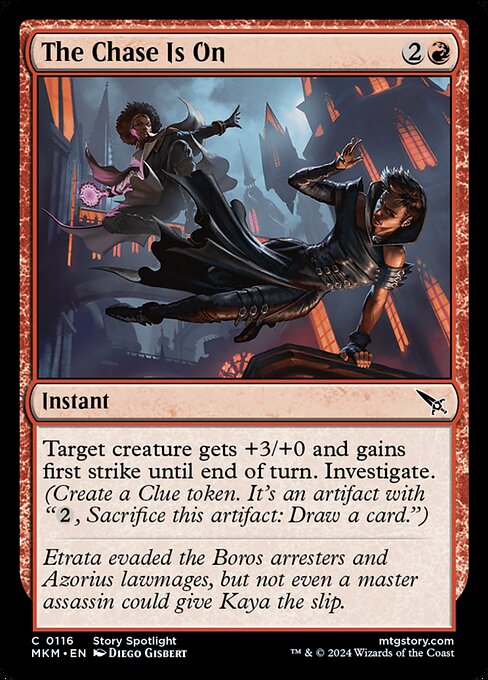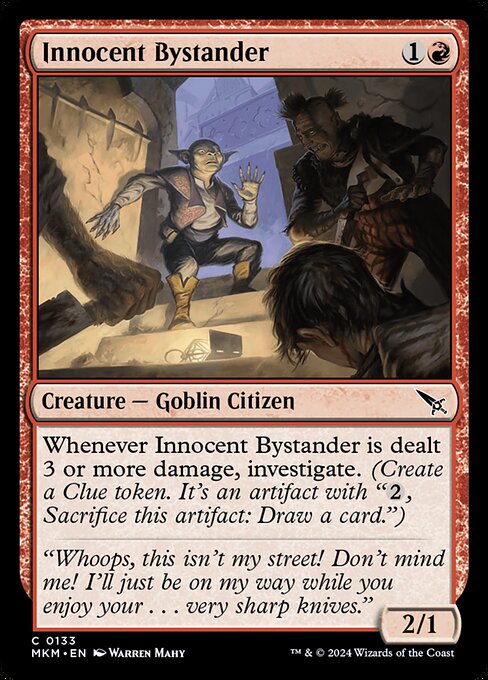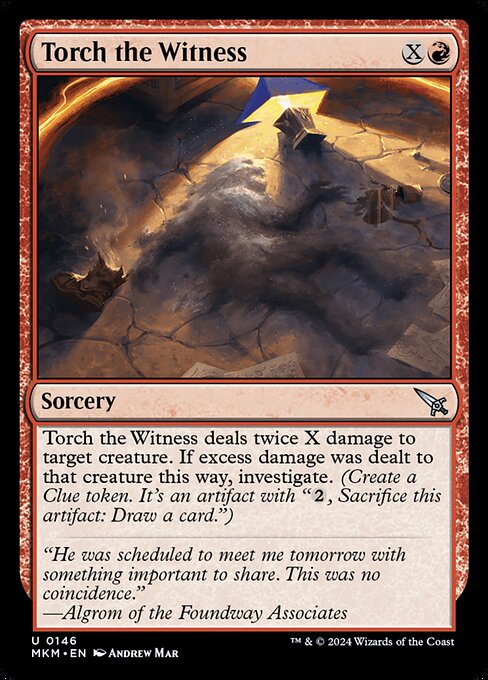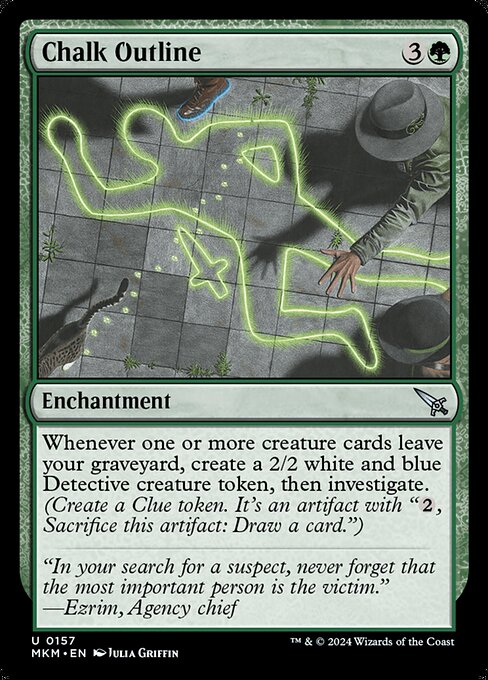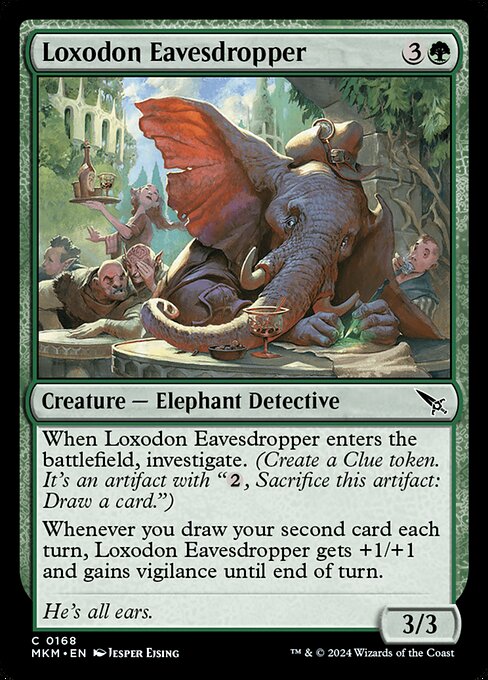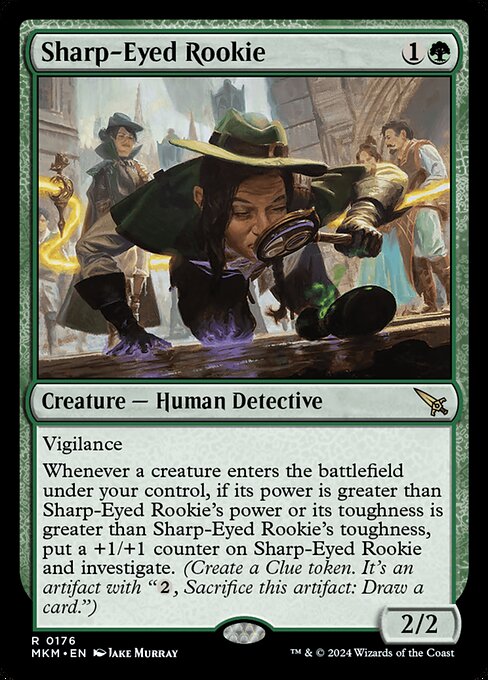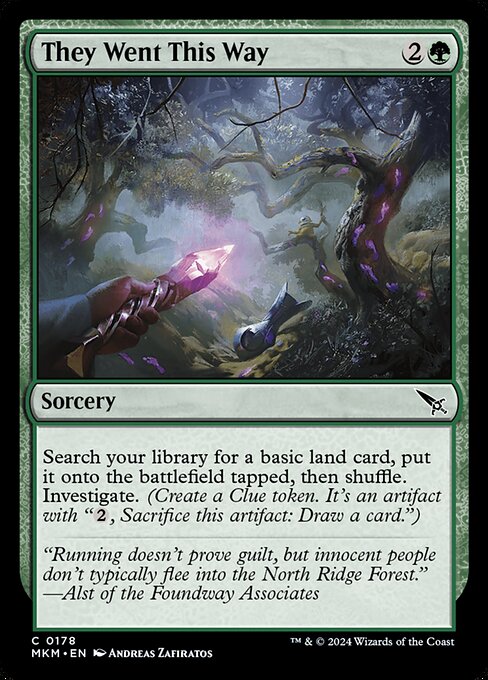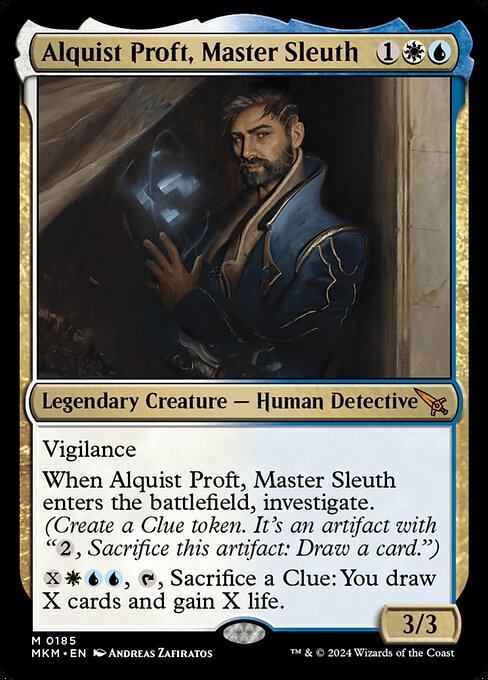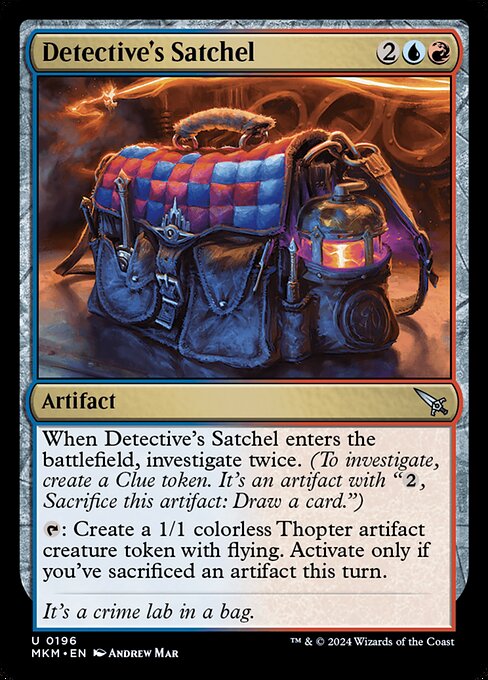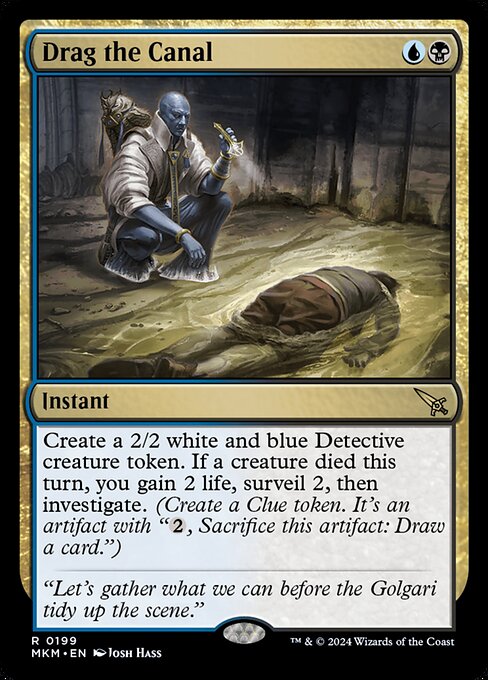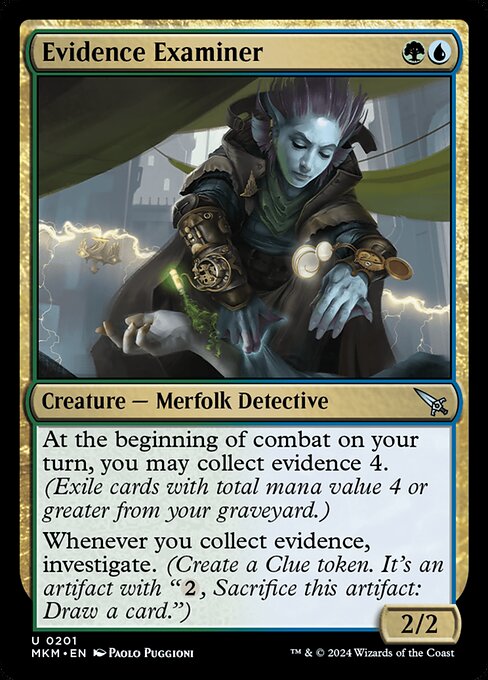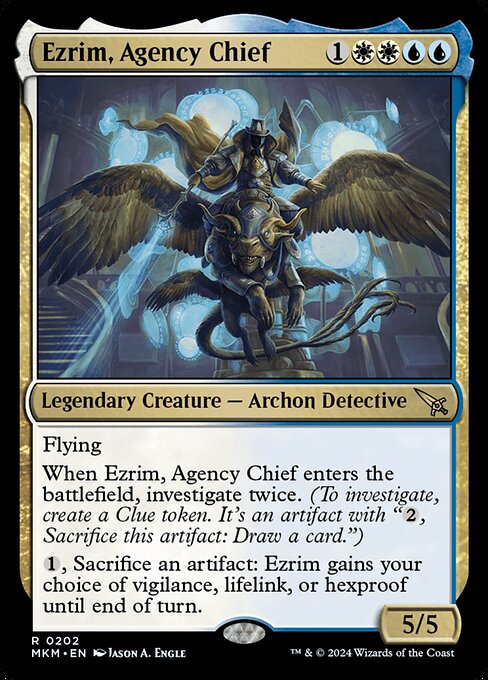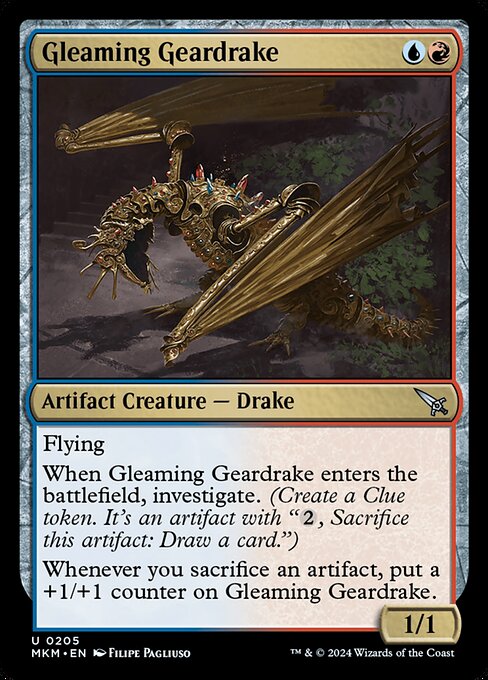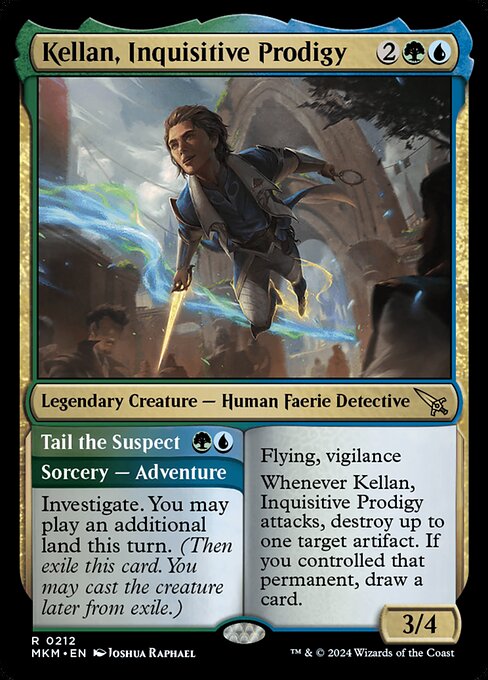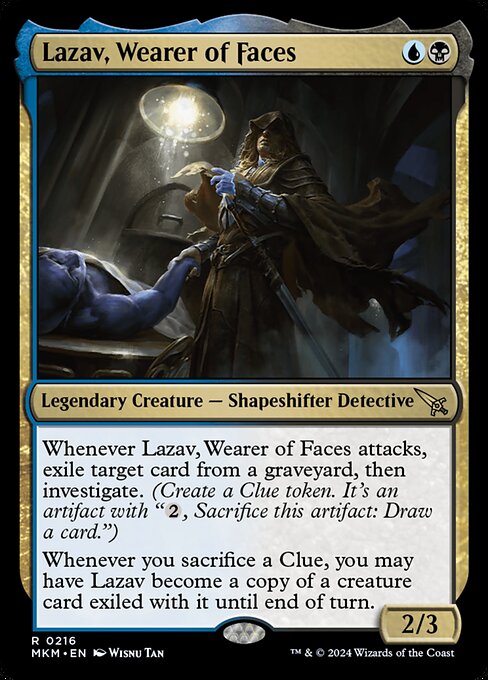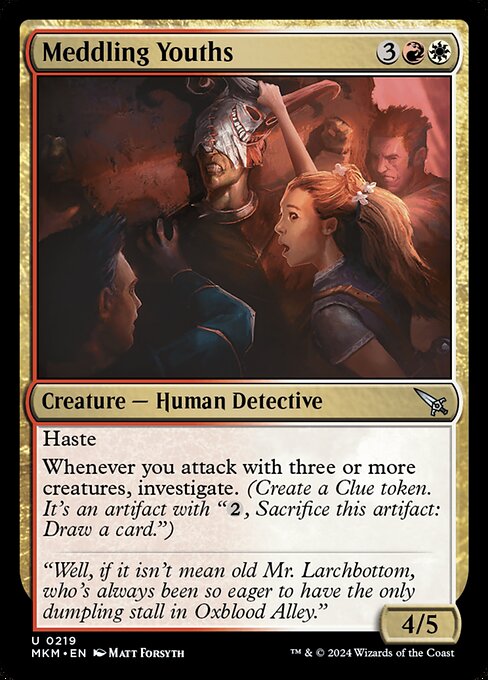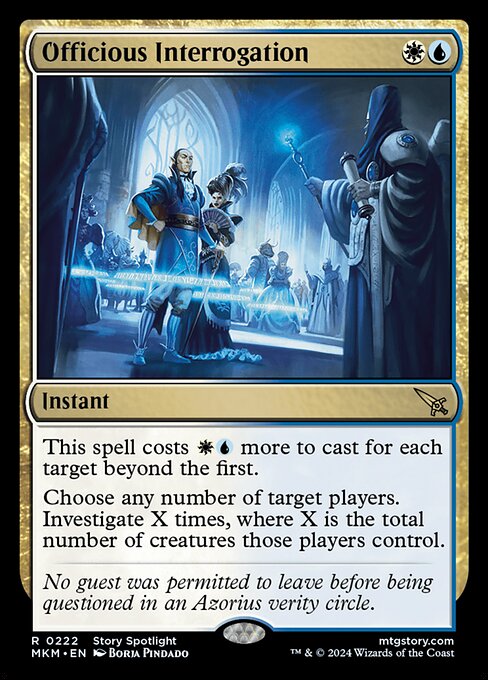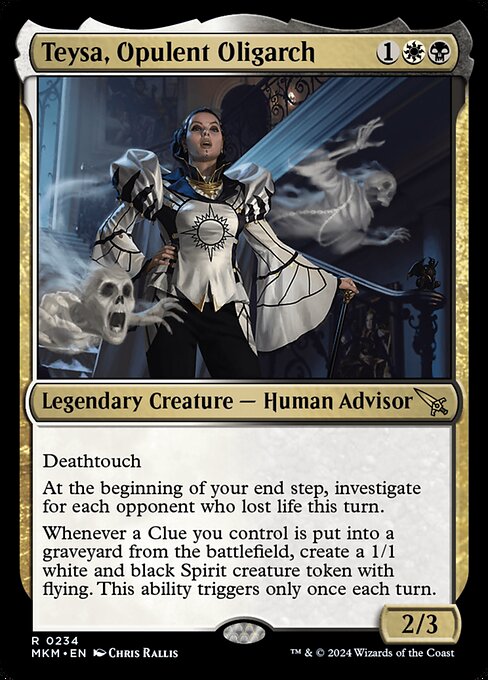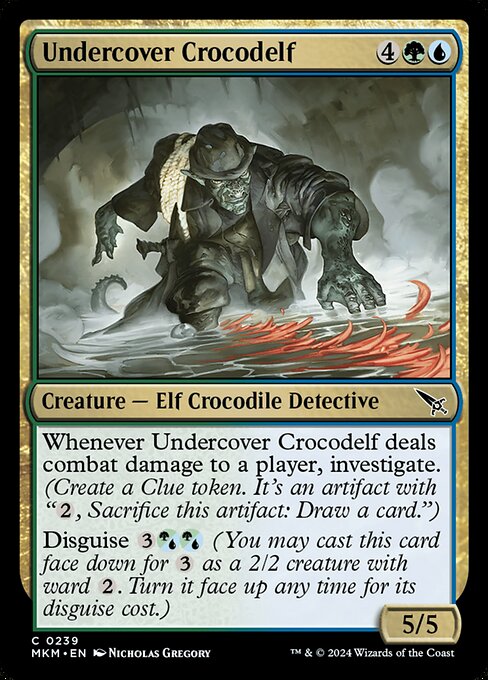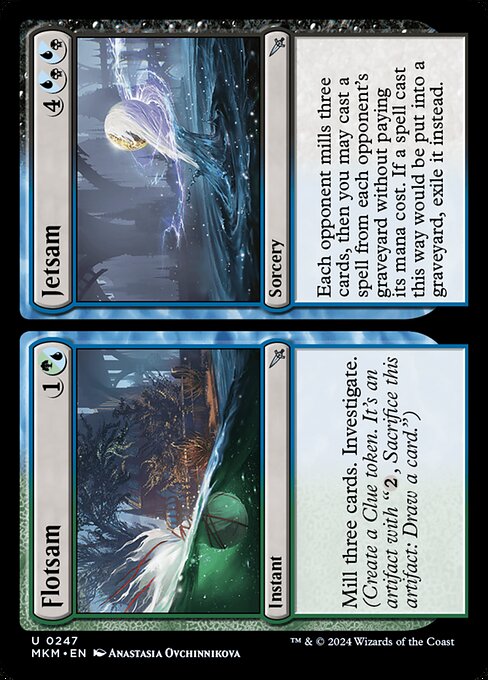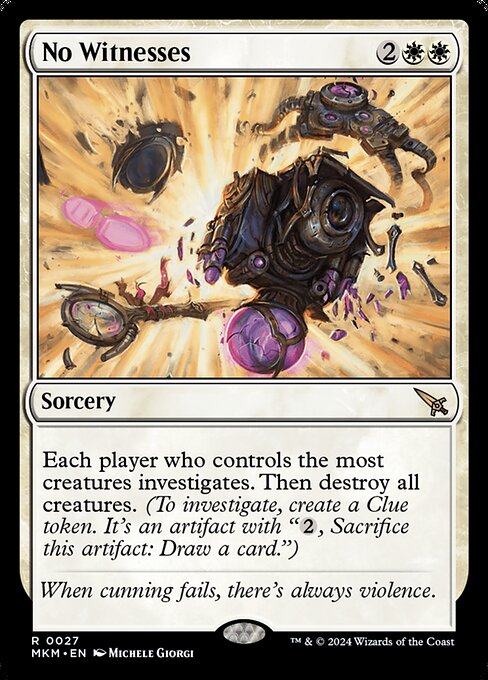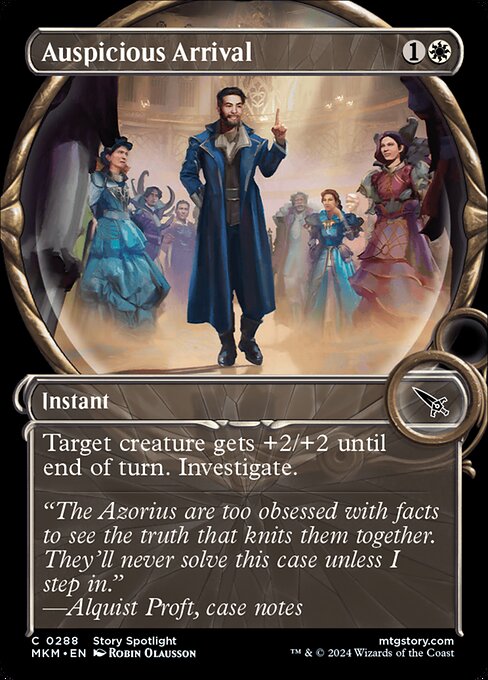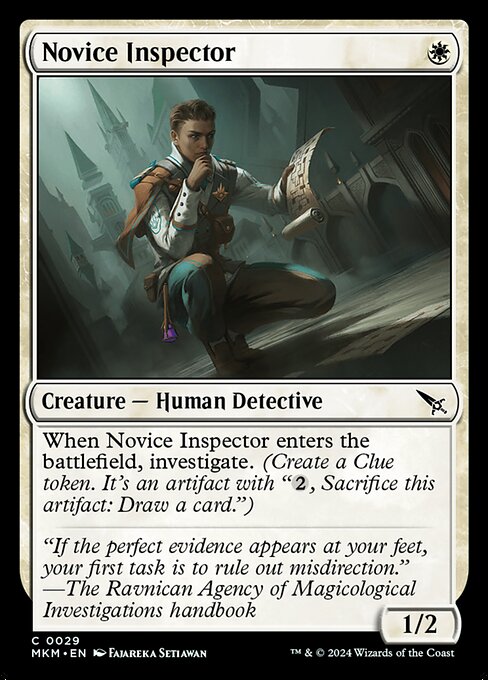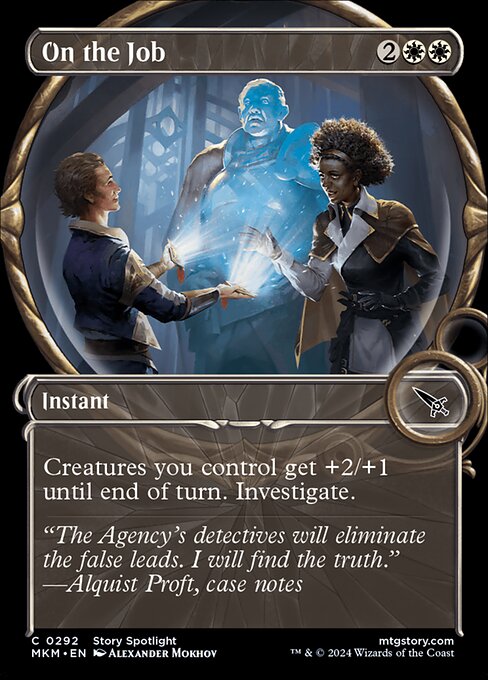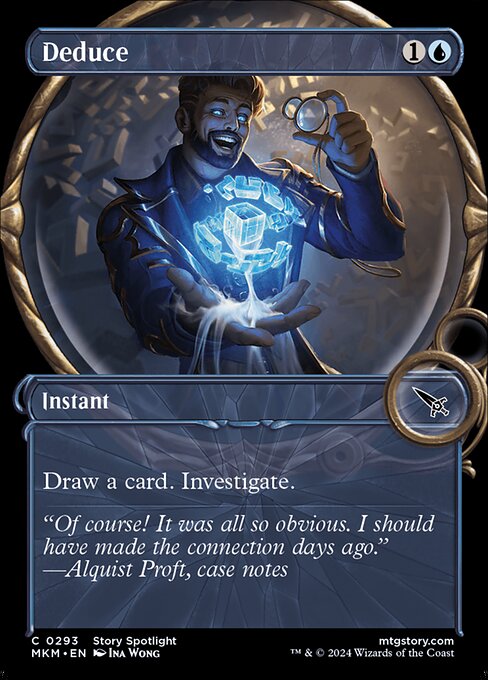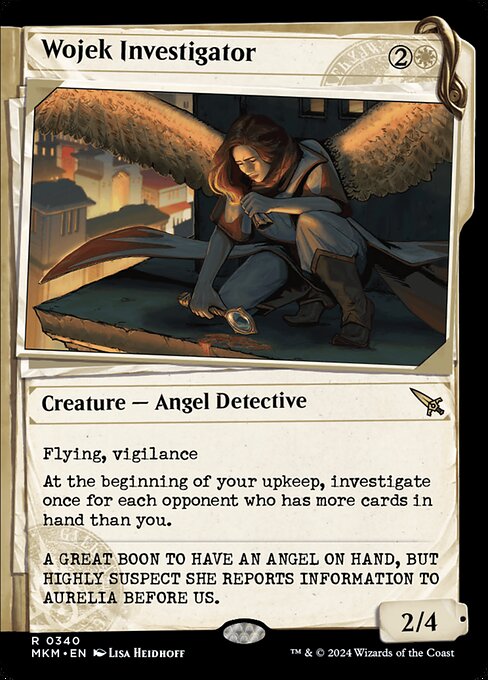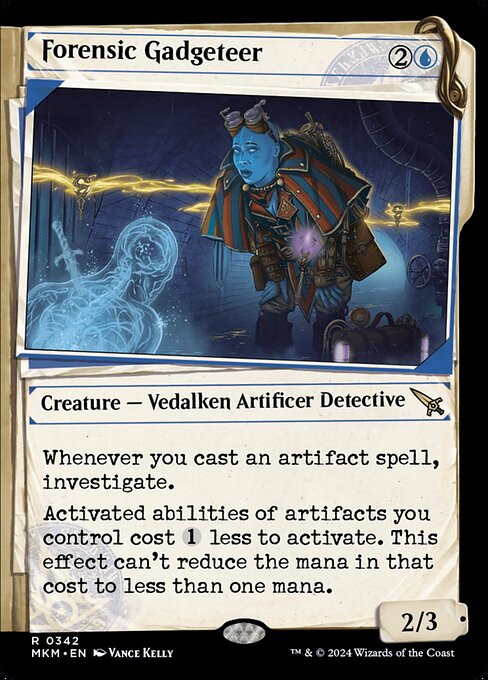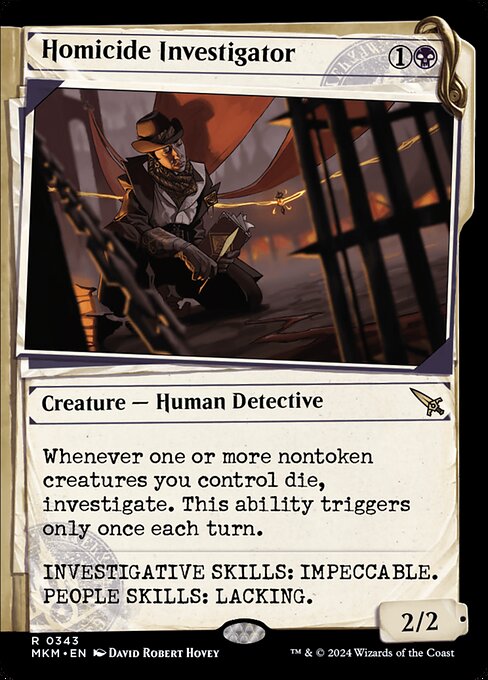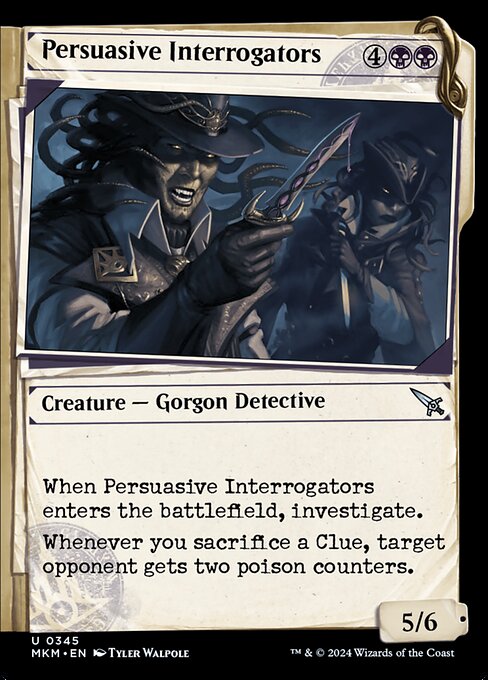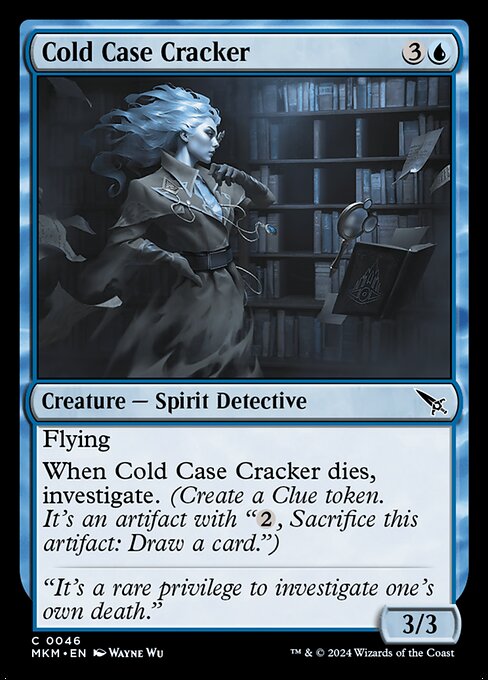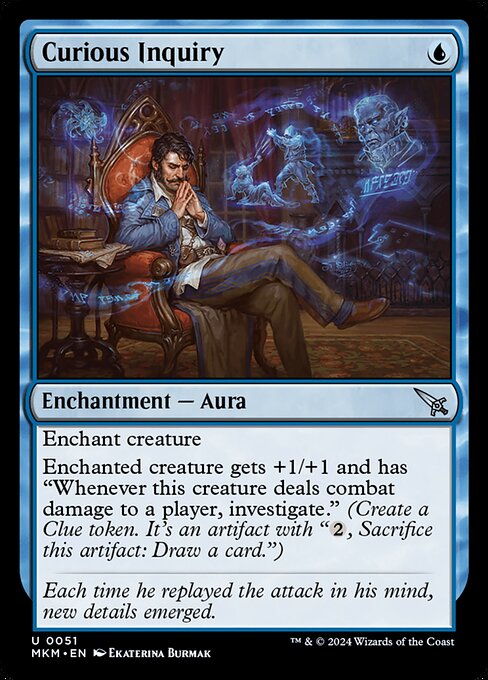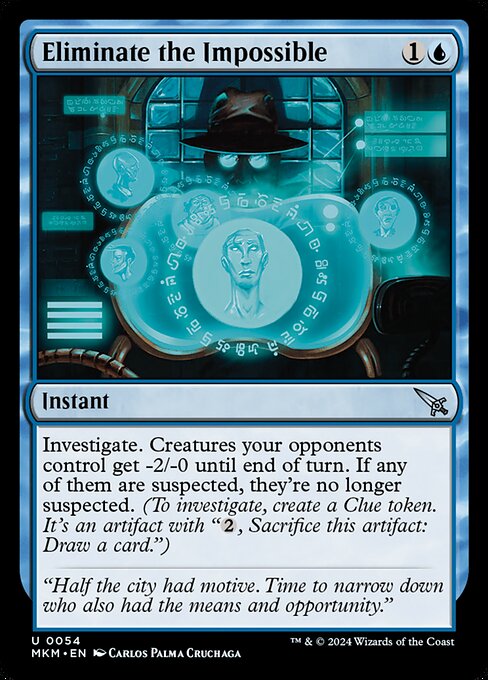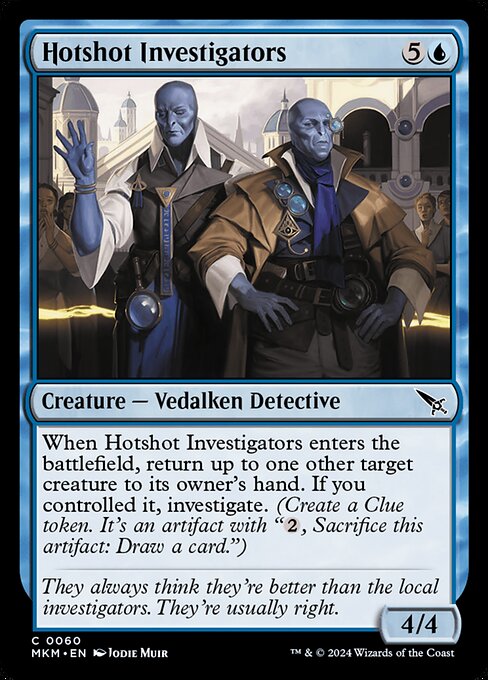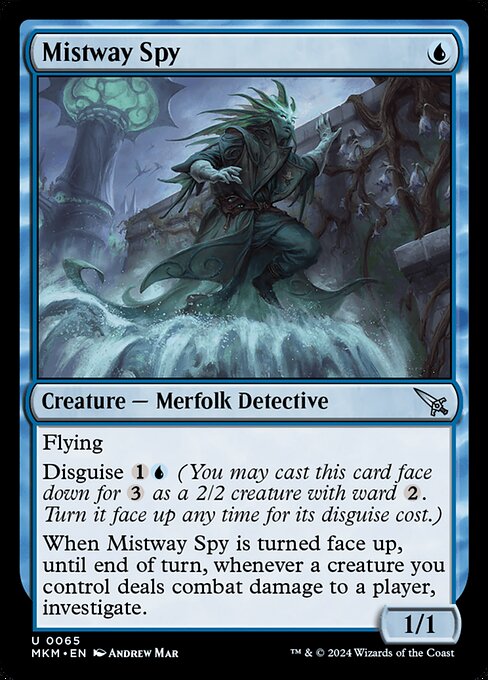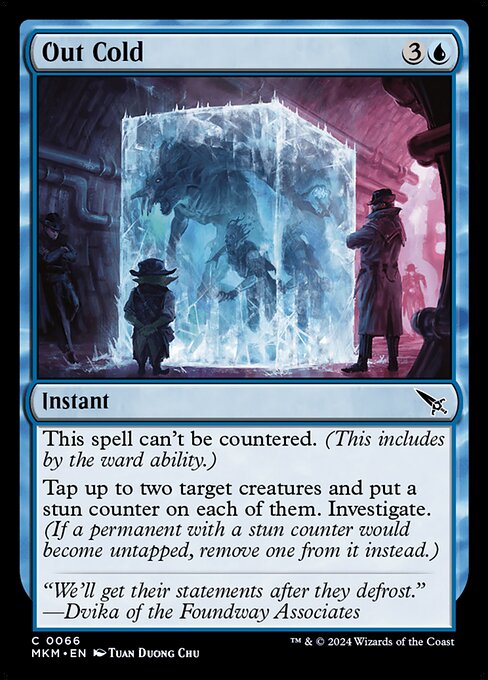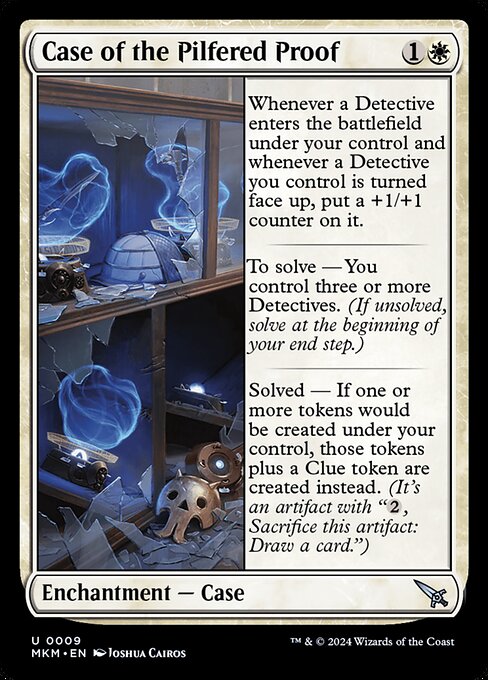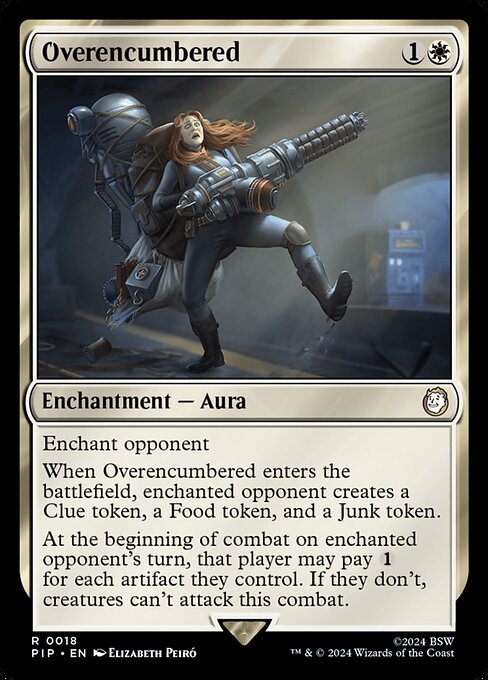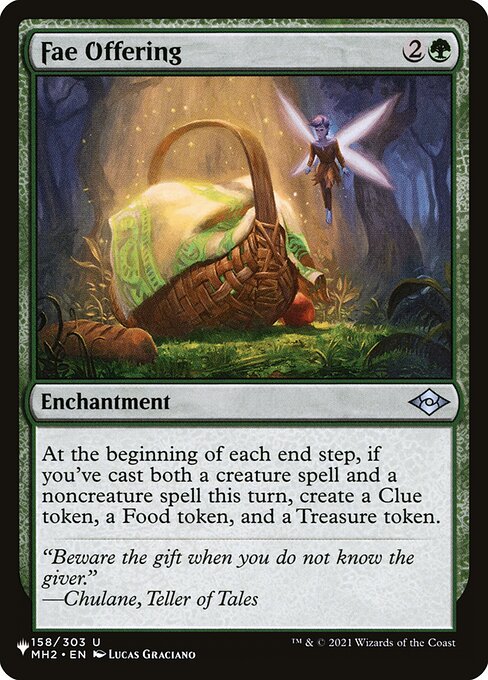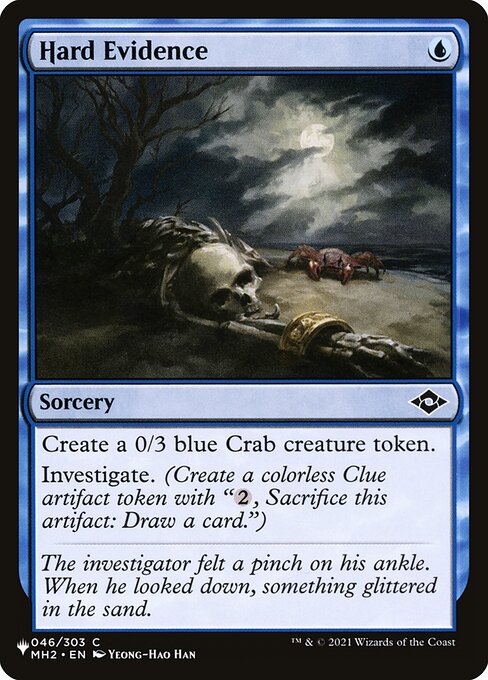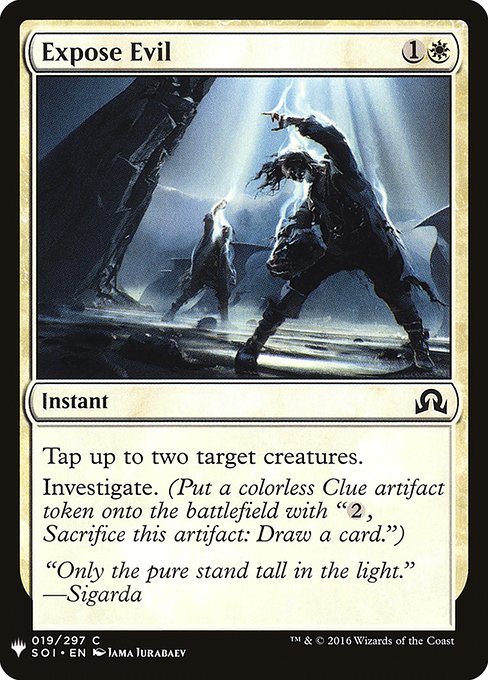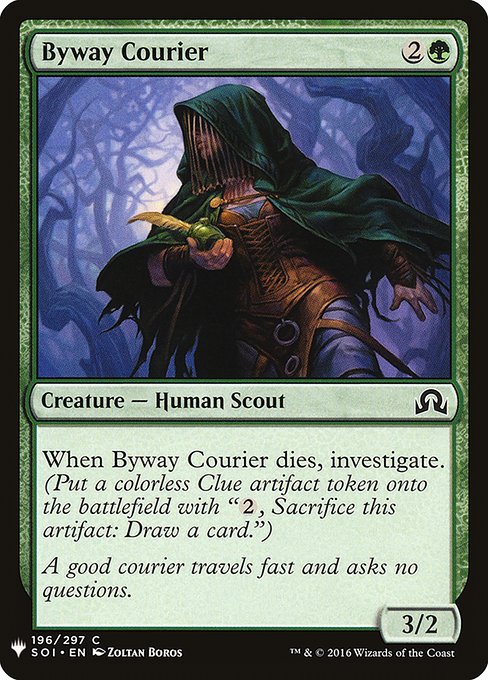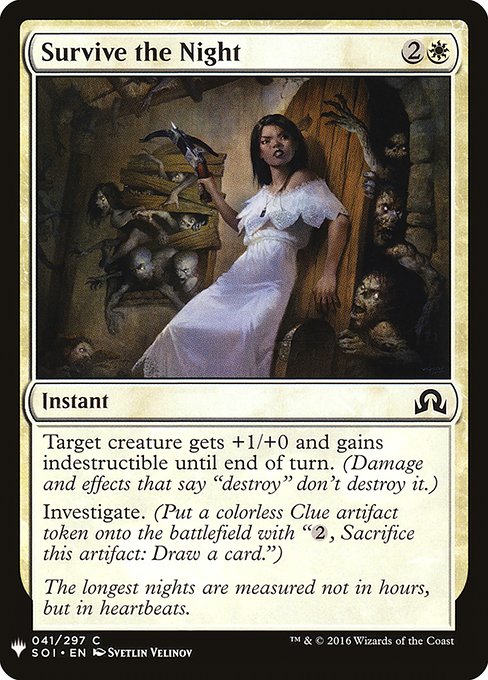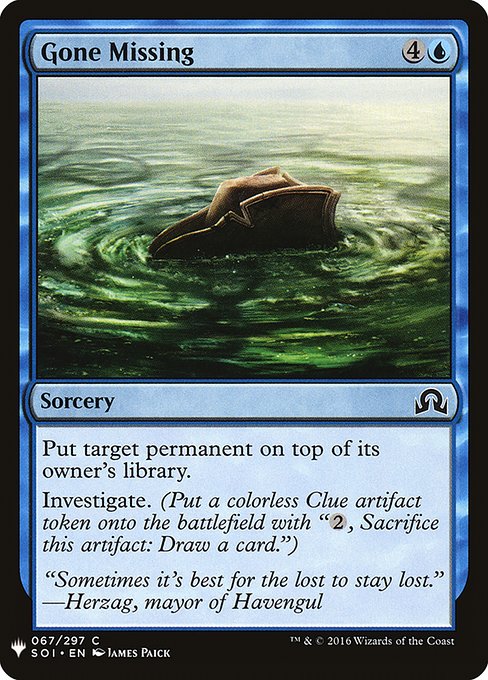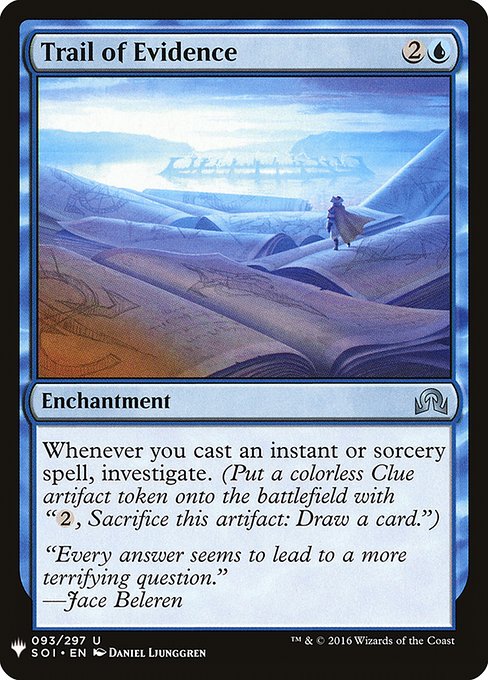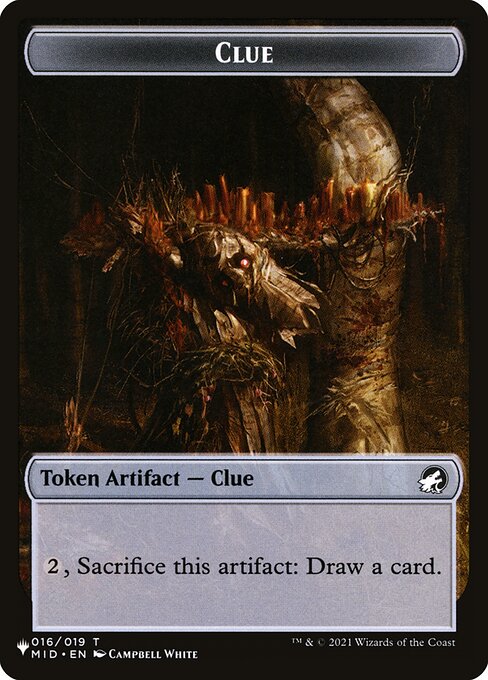Case of the Filched Falcon
Enchantment — Case
When this Case enters the battlefield, investigate. (Create a Clue token. It's an artifact with ", Sacrifice this artifact: Draw a card.")
To solve — You control three or more artifacts. (If unsolved, solve at the beginning of your end step.)
Solved — , Sacrifice this Case: Put four +1/+1 counters on target noncreature artifact. It becomes a 0/0 Bird creature with flying in addition to its other types.
To solve — You control three or more artifacts. (If unsolved, solve at the beginning of your end step.)
Solved — , Sacrifice this Case: Put four +1/+1 counters on target noncreature artifact. It becomes a 0/0 Bird creature with flying in addition to its other types.
standard
future
historic
gladiator
pioneer
explorer
modern
legacy
pauper
vintage
penny
commander
brawl
alchemy
paupercommander
duel
oldschool
premodern
Rulings
The artifact retains any types, subtypes, or supertypes it has.
Cases don’t lose their other abilities when they become solved.
If the target artifact is an attached Equipment, it becomes unattached. If an Equipment without reconfigure becomes an artifact creature, it can’t be attached to another creature.
Each Case has two special keyword abilities: to solve and solved.
The resulting artifact creature will be able to attack on your turn if it’s been under your control continuously since the turn began. That is, it doesn’t matter how long it’s been a creature, just how long it’s been on the battlefield.
The meaning of “solved” differs based on what type of ability follows it. “Solved — [activated ability]” means “[Activated ability]. Activate only if this Case is solved.” Activated abilities contain a colon. They’re generally written “[Cost]: [Effect].”
Being solved is not part of a permanent’s copiable values. A permanent that becomes a copy of a solved Case is not solved. A solved Case that somehow becomes a copy of a different Case stays solved.
Some abilities trigger “whenever you sacrifice a Clue”. Those abilities trigger whenever you sacrifice a Clue for any reason, not just to activate a Clue’s activated ability.
If an effect refers to a Clue, it means any Clue artifact, not just a Clue artifact token. For example, you can sacrifice Wrench to pay for Alquist Proft, Master Sleuth’s activated ability.
“Solved — [static ability]” means “As long as this Case is solved, [static ability].” Static abilities are written as statements, such as “Creatures you control get +1/+1” or “Instant and sorcery spells you cast cost less to cast.”
“Solved — [Triggered ability]” means “[Triggered ability]. This ability triggers only if this Case is solved.” Triggered abilities use the word “when,” “whenever,” or “at.” They’re often written as “[Trigger condition], [effect].”
If the target noncreature artifact is a Vehicle, its power and toughness will be set to 0/0. Crewing that Vehicle will not restore its power and toughness.
Some spells and abilities that investigate may require targets. If each target chosen is an illegal target as that spell or ability tries to resolve, it won’t resolve. You won’t create any Clue tokens.
Clue is an artifact type. Even though it appears on some cards with other permanent types, it’s never a creature type, a land type, or anything but an artifact type.
You can’t sacrifice a Clue to pay multiple costs. For example, you can’t sacrifice a Clue token to activate its own ability and also to activate Alquist Proft, Master Sleuth’s ability.
Once a Case becomes solved, it stays solved until it leaves the battlefield.
“To Solve — [condition]” means “At the beginning of your end step, if [condition] and this Case is not solved, it becomes solved.”
“To solve” abilities will check for their condition twice: once when the ability would trigger, and once when it resolves. If the condition isn’t true at the beginning of your end step, the ability won’t trigger at all. If the condition isn’t true when the ability resolves, the Case won’t become solved.
Cases don’t lose their other abilities when they become solved.
If the target artifact is an attached Equipment, it becomes unattached. If an Equipment without reconfigure becomes an artifact creature, it can’t be attached to another creature.
Each Case has two special keyword abilities: to solve and solved.
The resulting artifact creature will be able to attack on your turn if it’s been under your control continuously since the turn began. That is, it doesn’t matter how long it’s been a creature, just how long it’s been on the battlefield.
The meaning of “solved” differs based on what type of ability follows it. “Solved — [activated ability]” means “[Activated ability]. Activate only if this Case is solved.” Activated abilities contain a colon. They’re generally written “[Cost]: [Effect].”
Being solved is not part of a permanent’s copiable values. A permanent that becomes a copy of a solved Case is not solved. A solved Case that somehow becomes a copy of a different Case stays solved.
Some abilities trigger “whenever you sacrifice a Clue”. Those abilities trigger whenever you sacrifice a Clue for any reason, not just to activate a Clue’s activated ability.
If an effect refers to a Clue, it means any Clue artifact, not just a Clue artifact token. For example, you can sacrifice Wrench to pay for Alquist Proft, Master Sleuth’s activated ability.
“Solved — [static ability]” means “As long as this Case is solved, [static ability].” Static abilities are written as statements, such as “Creatures you control get +1/+1” or “Instant and sorcery spells you cast cost less to cast.”
“Solved — [Triggered ability]” means “[Triggered ability]. This ability triggers only if this Case is solved.” Triggered abilities use the word “when,” “whenever,” or “at.” They’re often written as “[Trigger condition], [effect].”
If the target noncreature artifact is a Vehicle, its power and toughness will be set to 0/0. Crewing that Vehicle will not restore its power and toughness.
Some spells and abilities that investigate may require targets. If each target chosen is an illegal target as that spell or ability tries to resolve, it won’t resolve. You won’t create any Clue tokens.
Clue is an artifact type. Even though it appears on some cards with other permanent types, it’s never a creature type, a land type, or anything but an artifact type.
You can’t sacrifice a Clue to pay multiple costs. For example, you can’t sacrifice a Clue token to activate its own ability and also to activate Alquist Proft, Master Sleuth’s ability.
Once a Case becomes solved, it stays solved until it leaves the battlefield.
“To Solve — [condition]” means “At the beginning of your end step, if [condition] and this Case is not solved, it becomes solved.”
“To solve” abilities will check for their condition twice: once when the ability would trigger, and once when it resolves. If the condition isn’t true at the beginning of your end step, the ability won’t trigger at all. If the condition isn’t true when the ability resolves, the Case won’t become solved.
Rulings
The artifact retains any types, subtypes, or supertypes it has.
Cases don’t lose their other abilities when they become solved.
If the target artifact is an attached Equipment, it becomes unattached. If an Equipment without reconfigure becomes an artifact creature, it can’t be attached to another creature.
Each Case has two special keyword abilities: to solve and solved.
The resulting artifact creature will be able to attack on your turn if it’s been under your control continuously since the turn began. That is, it doesn’t matter how long it’s been a creature, just how long it’s been on the battlefield.
The meaning of “solved” differs based on what type of ability follows it. “Solved — [activated ability]” means “[Activated ability]. Activate only if this Case is solved.” Activated abilities contain a colon. They’re generally written “[Cost]: [Effect].”
Being solved is not part of a permanent’s copiable values. A permanent that becomes a copy of a solved Case is not solved. A solved Case that somehow becomes a copy of a different Case stays solved.
Some abilities trigger “whenever you sacrifice a Clue”. Those abilities trigger whenever you sacrifice a Clue for any reason, not just to activate a Clue’s activated ability.
If an effect refers to a Clue, it means any Clue artifact, not just a Clue artifact token. For example, you can sacrifice Wrench to pay for Alquist Proft, Master Sleuth’s activated ability.
“Solved — [static ability]” means “As long as this Case is solved, [static ability].” Static abilities are written as statements, such as “Creatures you control get +1/+1” or “Instant and sorcery spells you cast cost less to cast.”
“Solved — [Triggered ability]” means “[Triggered ability]. This ability triggers only if this Case is solved.” Triggered abilities use the word “when,” “whenever,” or “at.” They’re often written as “[Trigger condition], [effect].”
If the target noncreature artifact is a Vehicle, its power and toughness will be set to 0/0. Crewing that Vehicle will not restore its power and toughness.
Some spells and abilities that investigate may require targets. If each target chosen is an illegal target as that spell or ability tries to resolve, it won’t resolve. You won’t create any Clue tokens.
Clue is an artifact type. Even though it appears on some cards with other permanent types, it’s never a creature type, a land type, or anything but an artifact type.
You can’t sacrifice a Clue to pay multiple costs. For example, you can’t sacrifice a Clue token to activate its own ability and also to activate Alquist Proft, Master Sleuth’s ability.
Once a Case becomes solved, it stays solved until it leaves the battlefield.
“To Solve — [condition]” means “At the beginning of your end step, if [condition] and this Case is not solved, it becomes solved.”
“To solve” abilities will check for their condition twice: once when the ability would trigger, and once when it resolves. If the condition isn’t true at the beginning of your end step, the ability won’t trigger at all. If the condition isn’t true when the ability resolves, the Case won’t become solved.
Cases don’t lose their other abilities when they become solved.
If the target artifact is an attached Equipment, it becomes unattached. If an Equipment without reconfigure becomes an artifact creature, it can’t be attached to another creature.
Each Case has two special keyword abilities: to solve and solved.
The resulting artifact creature will be able to attack on your turn if it’s been under your control continuously since the turn began. That is, it doesn’t matter how long it’s been a creature, just how long it’s been on the battlefield.
The meaning of “solved” differs based on what type of ability follows it. “Solved — [activated ability]” means “[Activated ability]. Activate only if this Case is solved.” Activated abilities contain a colon. They’re generally written “[Cost]: [Effect].”
Being solved is not part of a permanent’s copiable values. A permanent that becomes a copy of a solved Case is not solved. A solved Case that somehow becomes a copy of a different Case stays solved.
Some abilities trigger “whenever you sacrifice a Clue”. Those abilities trigger whenever you sacrifice a Clue for any reason, not just to activate a Clue’s activated ability.
If an effect refers to a Clue, it means any Clue artifact, not just a Clue artifact token. For example, you can sacrifice Wrench to pay for Alquist Proft, Master Sleuth’s activated ability.
“Solved — [static ability]” means “As long as this Case is solved, [static ability].” Static abilities are written as statements, such as “Creatures you control get +1/+1” or “Instant and sorcery spells you cast cost less to cast.”
“Solved — [Triggered ability]” means “[Triggered ability]. This ability triggers only if this Case is solved.” Triggered abilities use the word “when,” “whenever,” or “at.” They’re often written as “[Trigger condition], [effect].”
If the target noncreature artifact is a Vehicle, its power and toughness will be set to 0/0. Crewing that Vehicle will not restore its power and toughness.
Some spells and abilities that investigate may require targets. If each target chosen is an illegal target as that spell or ability tries to resolve, it won’t resolve. You won’t create any Clue tokens.
Clue is an artifact type. Even though it appears on some cards with other permanent types, it’s never a creature type, a land type, or anything but an artifact type.
You can’t sacrifice a Clue to pay multiple costs. For example, you can’t sacrifice a Clue token to activate its own ability and also to activate Alquist Proft, Master Sleuth’s ability.
Once a Case becomes solved, it stays solved until it leaves the battlefield.
“To Solve — [condition]” means “At the beginning of your end step, if [condition] and this Case is not solved, it becomes solved.”
“To solve” abilities will check for their condition twice: once when the ability would trigger, and once when it resolves. If the condition isn’t true at the beginning of your end step, the ability won’t trigger at all. If the condition isn’t true when the ability resolves, the Case won’t become solved.
Your collection? Your decks?
Want to manage your collection and/or create decks?
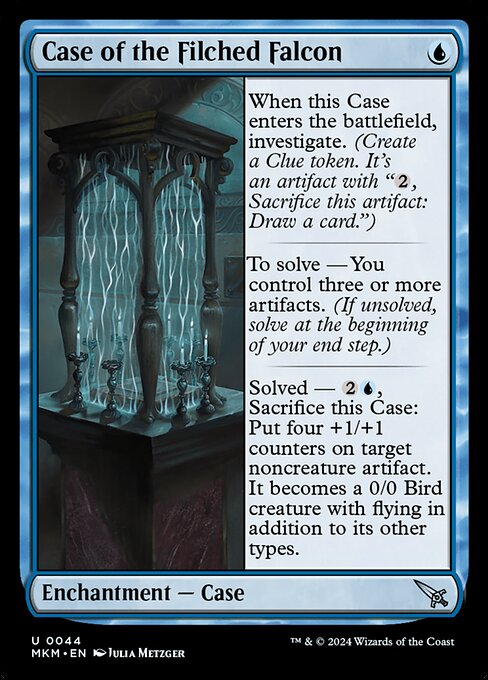

 0
0
 0.10€
0.10€
